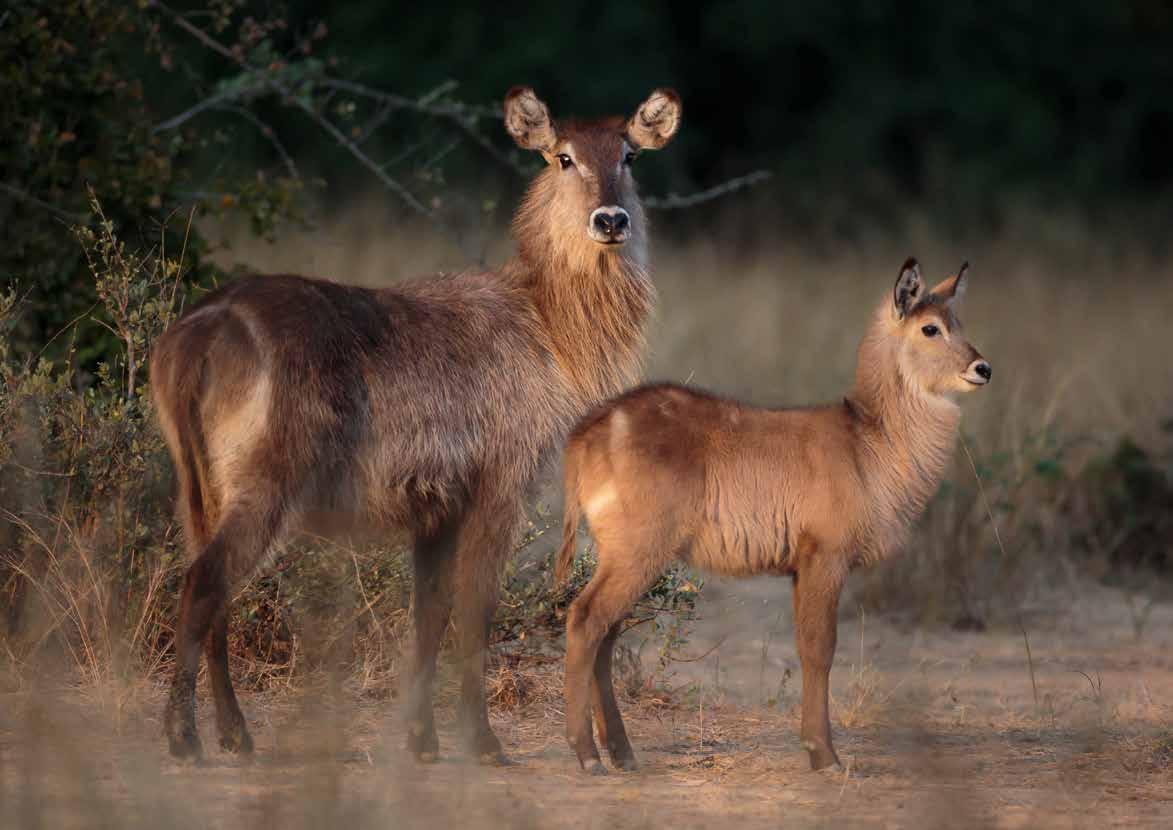2023 ANNUAL REPORT

OUR MISSION
To work with community and conservation partners in the protection of the wildlife and habitats of the South Luangwa ecosystem.



To work with community and conservation partners in the protection of the wildlife and habitats of the South Luangwa ecosystem.

The South Luangwa National Park marks the end of the Great Rift Valley along the banks of the Luangwa River as it makes its 800 km journey to meet the great Zambezi River before moving east into Mozambique. The South Luangwa Valley is renowned for its diverse wildlife, supporting over 60 species of mammals and 450 species of birds. Species include the unique Crawshay’s zebra, Cookson’s wildebeest and a geographically isolated population of Luangwa giraffe (G. t. thornicrofti), a subspecies of Masai giraffe. The Valley is known for its high densities of lions, leopards and wild dogs, and it remains a stronghold for elephants in Zambia.
Lusaka Lupande GMA Chipata South Luangwa National Park Lumimba GMA Mfuwe ZAMBIA LuangwaRiver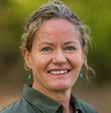
Dear friends, partners and supporters,
This year, we celebrated the extraordinary milestone of 20 years of conservation work in South Luangwa, and I am immensely proud to have played a part in this journey. As I reflect on our team of passionate and dedicated individuals, I know we are stronger than ever and our work will continue to have a significant impact on the wildlife, habitats and people of South Luangwa.
Despite these celebrations, 2023 was not without its difficulties as wildlife poaching and humanwildlife conflict continued to challenge us and our partners. Shifting poaching trends have resulted in us adapting our approach to anti-poaching, with a focus on intelligence-led, strategic deployment of our law enforcement resources. With support from our training partners, Frontier, we have now begun to see tangible results of this new approach and we are confident that this, paired with significant investment in conservation technology, will see continued improvement in anti-poaching efforts.
Our human-wildlife coexistence work also grew substantially this year. Through ongoing support for wildlife conflict mitigation strategies, community engagement via theatre performances and radio broadcasts, and investment in the conflict Rapid Response Unit (RRU), we are ensuring realtime support for communities across the region. The first of its kind in Zambia, the RRU is already proving a vital component in CSL’s multi-faceted approach to human-wildlife coexistence.
Dr Mwamba Sichande, CSL’s veterinarian, continued his important work, rescuing 15 wild animals and treating over 600 domestic animals at his Mfuwe clinic and during community outreach visits. The ability for Dr Sichande and CSL teams to respond quickly to reports of injured and snared animals has not only saved the lives of hundreds of animals over the last decade but also serves as a continual reminder about why we do what we do.
A huge thank you to our funders from across the world whose generosity enables CSL to evolve and expand each year. We were thrilled with the success of our first-ever online silent auction in celebration of our 20th year, as well as some incredible community support from match-funding campaigns and art auctions to photography exhibitions and endurance challenges. A special thanks to our Luangwa Conservation and Community Fund members, who remained steadfast during some extremely challenging years for tourism. Emerging from these challenges, they have continued to demonstrate their dedication to our work.
We look forward to another 20 years of impactful conservation programmes.
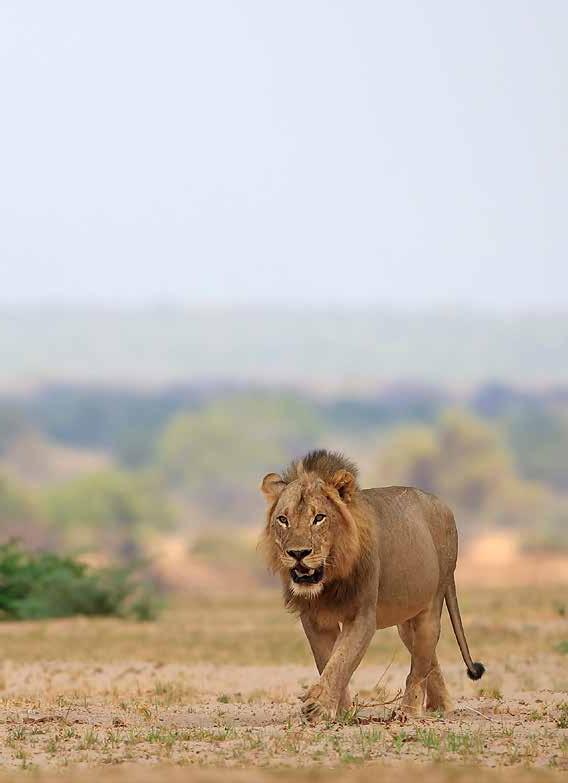

I am very proud of Rachel and the CSL team as we celebrated 20 years of important conservation work.
CSL has evolved from an informal group of dedicated volunteers and a handful of scouts into a modern and highly effective conservation force with 137 full-time employees. This includes 108 highly trained and motivated scouts who work with DNPW to protect the biodiversity of the Luangwa Valley.
The performance figures over the last 20 years are impressive and speak for themselves - highlighting over 8,500-foot patrols, 2,300 hours of aerial surveillance, 112,000 vehicles searched during K9 Unit roadblocks, 2,000 wildlife crime suspects arrested, over 1,000 illegal firearms confiscated, 12,000 wire snares recovered and over 300 animals either de-snared or otherwise rescued by CSL’s veterinarian.
An important part of any modern conservation effort involves engaging with communities and effectively addressing humanwildlife conflict. I am proud to say that CSL has been diligent and innovative, emerging as a regional leader in this fundamentally important initiative.
While there are challenges ahead, I have complete confidence in CSL’s ability to confront and overcome them.
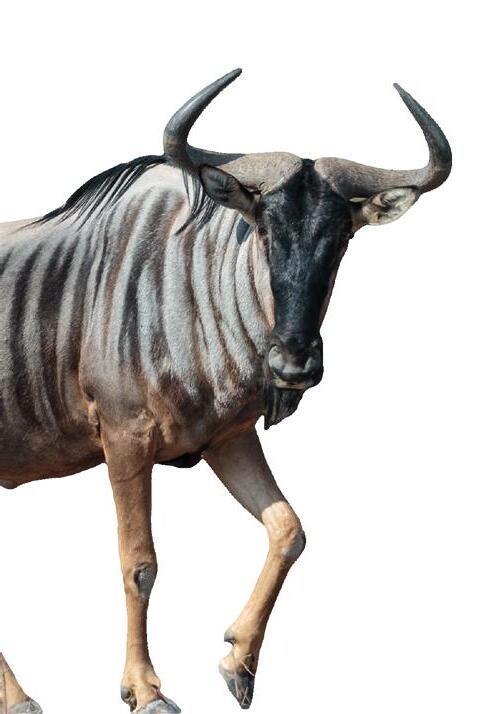
316 RAPID RESPONSE UNIT OPERATIONS
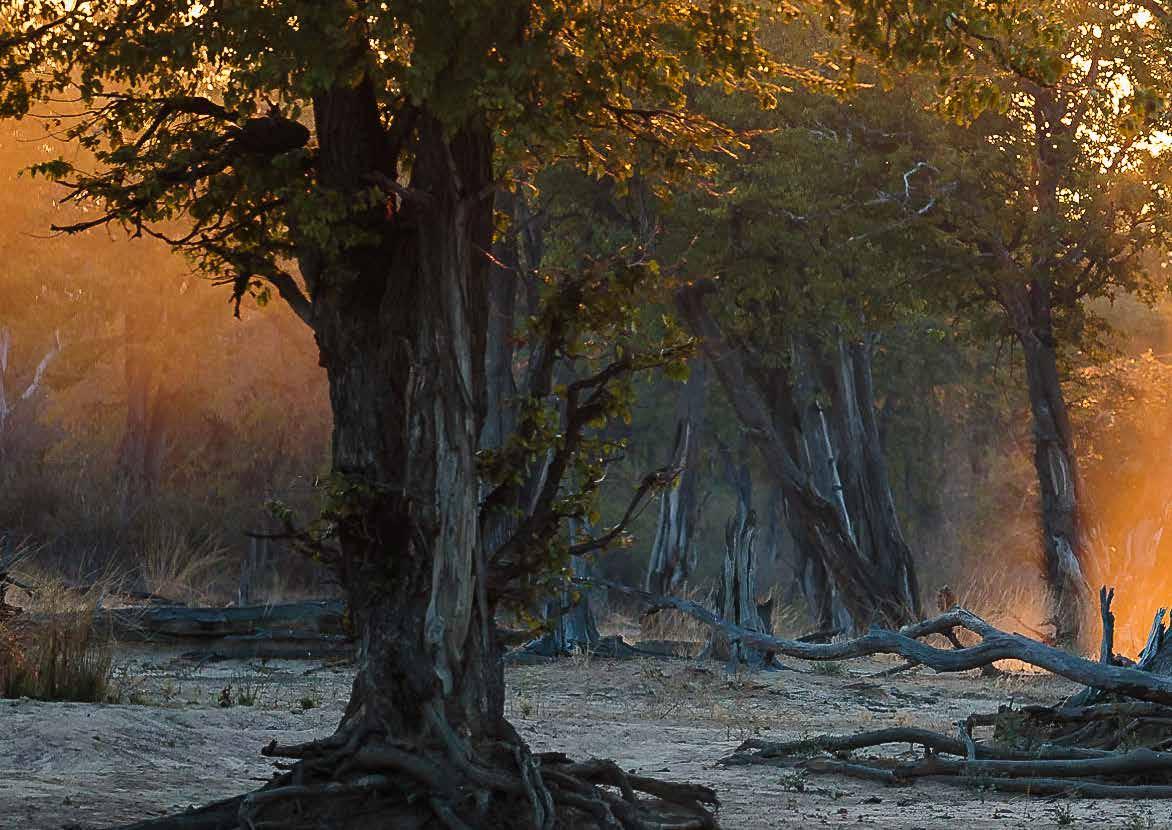
30 CHILLI PATROLLERS
26 KM OF SOLAR AND ‘SMELLY’ FENCING INSTALLED
496 KG OF CHILLIES HARVESTED BY 26 FARMERS
NINE ELEPHANT-SAFE GRAIN STORES CONSTRUCTED FARMERS ATTENDED 20 CHILLI GROWING WORKSHOPS
OVER 1,500 FARMERS SUPPORTED BY MITIGATION MEASURES
5,461
PEOPLE ATTENDED 41 THEATRE PERFORMANCES
1,216 COMMUNITY MEMBERS PARTICIPATED IN 142 COMMUNITY GAME DRIVES
25
HOURS OF THE CONSERVATION HOUR RADIO SHOW REACHING MORE THAN 50,000 LISTENERS
108 COMMUNITY SCOUTS IN EMPLOYMENT 20 NEWLY TRAINED COMMUNITY SCOUTS
728 WIRE SNARES REMOVED
1.2 TONNES OF BUSHMEAT CONFISCATED
197 WILDLIFE CRIME SUSPECTS ARRESTED
115
252 POACHERS’ CAMPS AND DRYING RACKS OBSERVED FIREARMS CONFISCATED
711 KG IVORY REMOVED FROM CIRCULATION
165 HOURS OF FIXED-WING AERIAL SURVEILLANCE
329 DAY PATROLS
14,365 VEHICLES SEARCHED K9 UNIT
154 OPERATIONS
74,647 KM TOTAL PATROL COVERAGE WITH DNPW
121 HOURS OF HELICOPTER PATROLS
15 ANIMALS RESCUED
19 COMMUNITY OUTREACH VISITS
SEVEN STUDENTS MENTORED
17,662 FOOT PATROL PERSON DAYS
19 SHORT FIVEDAY PATROLS
466 LONG 10-DAY PATROLS
581 DOMESTIC DOGS AND CATS VACCINATED AGAINST RABIES
44 DOMESTIC DOGS AND CATS STERILISED
212 ANIMALS RECEIVED TREATMENT AT THE MFUWE CLINIC
236 COMMUNITY CLEAN SWEEPS
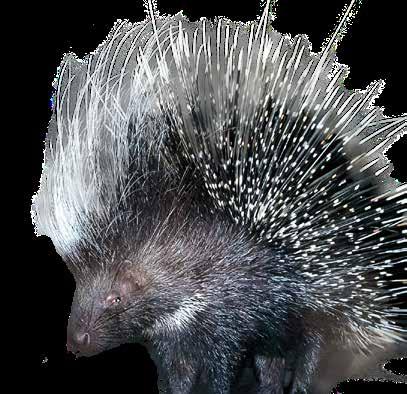
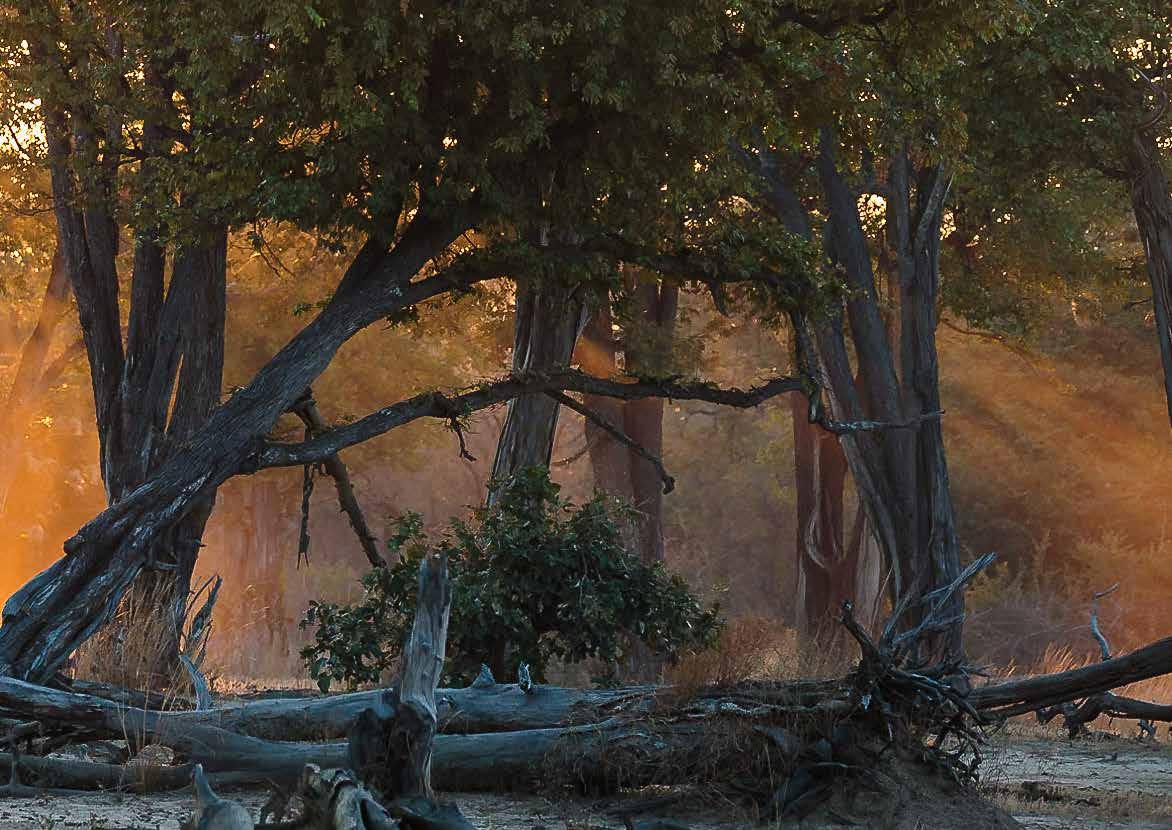
For the past 18 years, Maureen Mulenga served as a community scout, trained to track and apprehend poachers. In late 2023, she joined the human-wildlife conflict (HWC) Rapid Response Unit (RRU) alongside three other female scouts. It might seem like a small step, but moving away from law enforcement requires a significant shift in mindset. No longer facing a distinct enemy, she now walks a fine line of helping people whilst at the same time protecting wildlife. It is a difficult and delicate balance, requiring commitment and patience.
This year, the RRU responded to 316 conflict incidents, reflecting a 12% rise compared to 2022. The DNPW-CSL RRU team and their impact has been one of the highlights for the Community Human-Wildlife Coexistence (HWCx) team this year. Their work has prevented the escalation of wildlife conflicts and they have been able to swiftly attend to people injured by wildlife, transporting them to hospital for medical care. In 2023, we have seen the number of legally killed elephants by wildlife authorities reduced by half as a result of their work. We finished the year with the exciting news that we have secured funding to expand the RRU team, adding a second vehicle, equipment and personnel.
Frackson Sakala (pictured right), Senior Field Officer, initiated our first farmer exchange visits with representatives from four chiefdoms. The emphasis of these visits was to share insights, knowledge and experiences and learn about effective mitigations and best practices in HWC behaviour. Collaborating with CSL and DNPW colleagues, Frackson facilitated discussions that have started positive behavioural changes and the visits have shown considerable effectiveness in addressing HWC and promoting coexistence as a result of the peer-to-peer learning.
Slowly but surely, we are gaining more traction, improving awareness, and promoting better coexistence in South Luangwa.
 Emma Robinson Human-Wildlife Coexistence Programme Manager
Emma Robinson Human-Wildlife Coexistence Programme Manager
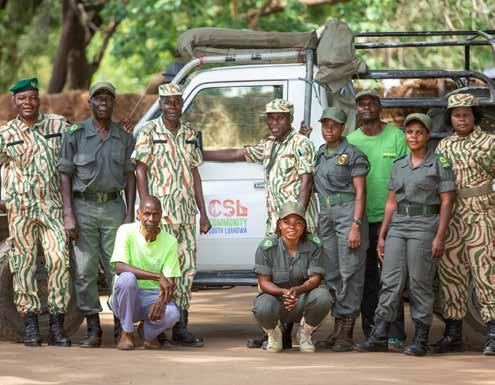
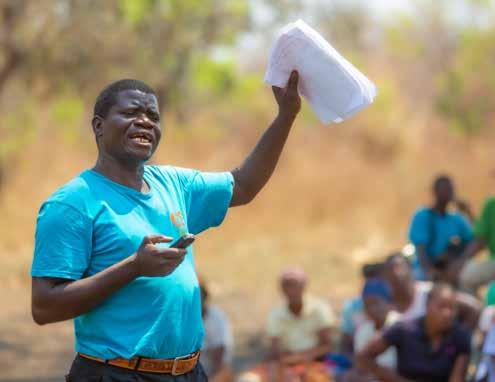
In 2023, CSL presented 25 hours of The Conservation Hour radio show, a regular feature on Mnkhanya Community Radio station. Every Wednesday evening, CSL, the Zambian Carnivore Programme (ZCP) and Chipembele Wildlife Education Trust take turns to discuss topics that inform and engage the local community about conservation issues. Once a month, all three organisations combine for a joint recap show. Over 50,000 listeners are given the opportunity to phone in and ask questions. Wide-scale messaging via radio is a valuable tool in helping communities understand how to safely prevent and reduce wildlife conflict.
In South Luangwa, regular radio shows, guided game drives and engaging theatre performances play an important role in bridging the gap between communities and wildlife conservation efforts. These activities facilitate the sharing of effective HWC mitigation measures. Consequently, they not only enhance community awareness but also inspire active participation in the shared commitment towards CSL’s conservation goals.
SEKA theatre performances have brought great change here at Chilekati Village of Chief Malama. The lessons learned from SEKA drama group and [the solar] fences have helped farmers in Malama to have bumper harvest than before. I urge communities to take these performances seriously.
JESLINE SAKALA Malama Chiefdom

In 2023, 41 drama performances reached an audience of 5,461 people. Across local villages, the Mfuwe-based SEKA theatre group not only enact the frustrations that farmers experience with elephants and other conflict species but works closely with CSL to communicate solutions that have proved successful in reducing conflict. The theatre group communicates how people can protect themselves and their livelihoods using humour, visual imagery, puppets and local song and dance.
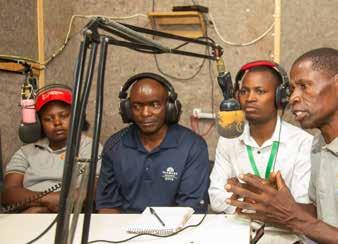
Every week, community members from areas surrounding the South Luangwa National Park are given the opportunity to explore the Park with qualified safari guides, observing and learning about wildlife. This year, 142 community game drives took 1,216 community members into the Park, marking a 21% increase from the previous year. Of the number of participants, 66% had never experienced a game drive before, despite living near the Park’s boundaries.
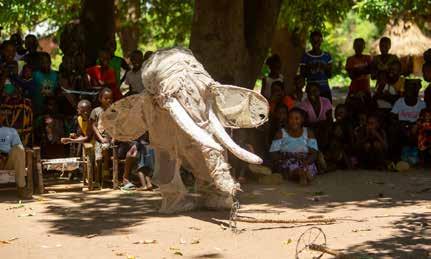
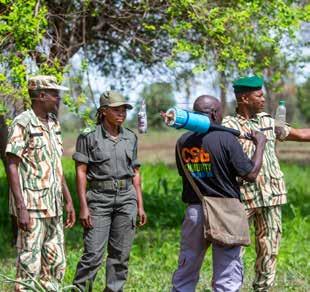
In 2023, CSL community data collectors recorded over 900 incidents of HWC, with elephants accounting for 72% of these through crop and property damage. The total estimated loss of livelihood in 2023, resulting from crop and property damage, and livestock predation, exceeded ZMW 1,000,000 (approximately $46,000 USD).
CSL has developed and implemented several initiatives for preventing and mitigating human-elephant conflict (HEC). The following initiatives support communities in seven chiefdoms across the Mambwe District.
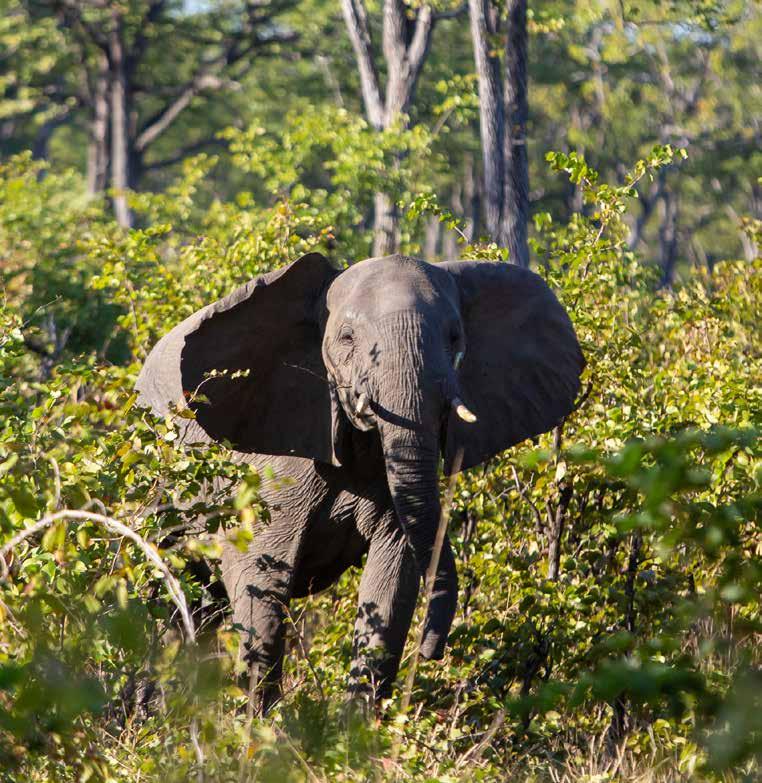
A well-established approach CSL employs to address HEC involves the use of chilli bombers to discourage elephants from entering crop fields. These devices launch ping-pong balls filled with a mixture of chilli soaked in petrol and mixed with cooking oil. The combination of the blast sound, the impact on the skin, and the smell of the chilli mixture deters elephants but causes no harm. In 2023, 30 volunteer chilli patrollers protected crops. The HWCx team also made 50 new chilli bombers for community resource boards to allocate and use in helping more farmers protect their crops.
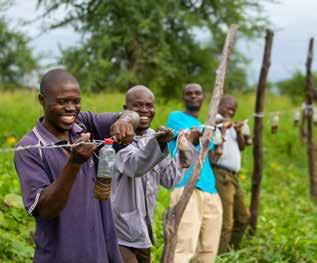
During the dry season, elephants often damage houses while searching for food, posing risks to people during night raids. After harvest, farmers store grain in their homes or traditional mud and stick structures, which makes them susceptible to elephant damage, termites, bacteria, and rodents. To address this, CSL constructs sturdy grain stores using cement and bricks, and the community provides sand and water. These robust grain stores have proven to protect harvests. In 2023, nine stores were built, totalling 176 grain stores in operation. The HWCx team monitors and maintains these stores, ensuring proper use and addressing issues. This year, the team maintained eight older stores.
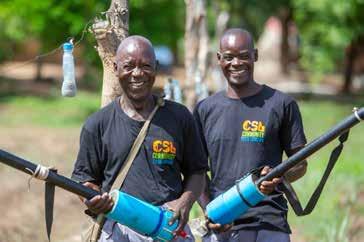
Another HEC mitigation initiative employed by CSL to prevent crop damage is the installation of ‘smelly’ and solar fences around established farming blocks in key conflict hotspots. In 2023, CSL implemented 26 km of ‘smelly’ and solar fencing (16 km ‘smelly’ and 10 km solar). These fences supported nearly 1,000 farmers.
The ‘smelly’ fence consists of bottles containing locally available smelly ingredients suspended on barbed wire between fence posts. Following a successful trial of the ‘smelly’ fence in Kakumbi Chiefdom in 2022, CSL expanded it in 2023, installing 8 km along three farming blocks. Furthermore, CSL conducted trials in Malama (1.69 km), Mwanya (2.8 km) and Nsefu (3.7 km) chiefdoms.
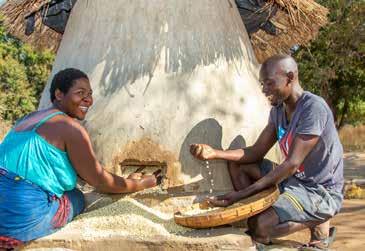
My harvest was five bags of 50 kg of maize, which could feed my family for four months. But by protecting crops as a chilli patroller, I am able to harvest 15 to 20 bags of 50 kg of maize. Hunger is a story of the past to me.
ABESART MBEWE (pictured right)
Kakumbi Chiefdom
The solar-powered electric fences, which use polywire, are constructed through collaboration with DNPW and the local community. In 2023, CSL installed 4 km of solar fencing along one farming block in Kakumbi Chiefdom and approximately 5.74 km of solar fencing along three farming blocks in Malama Chiefdom.
CSL field officers work with farmers to establish and sustain the fences for effective crop protection. Through the provision of practical tools and knowledge, CSL not only addresses the immediate needs of crop protection but also nurtures a sense of ownership and hope within farming communities.
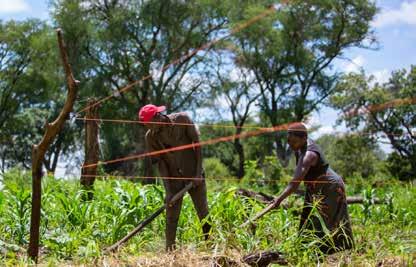
CSL addresses elephant crop raiding by promoting alternative cash crops such as chilli, turmeric and lemongrass, which are less attractive to elephants.
In 2023, 121 farmers cultivated Tabasco chillies for direct sale, personal consumption as well as ‘smelly’ fence and chilli bomber mitigations. The chilli harvest generated a yield of only 496 kg, marking a significant decrease from the previous year due to factors such as poor seed quality, drought and floods. This year’s harvest generated an income of ZMW 9,920 (approximately $500 USD).
Towards the end of the year, Billy Banda, RRU Conservation Coordinator, led 20 chilli growing workshops, training 513 farmers across six chiefdoms.
The Tilimbike Elephant Women’s Club, consisting of 20 women from Mnkhanya Chiefdom, received turmeric from CSL. Guided by Mwila Ng’andu, Field Officer, and Frackson Sakala, Senior Field Officer, the Women’s Club planted the turmeric, expecting a harvest in two years. Simultaneously, 17 farmers in the same area harvested their turmeric crop. The Tilimbike Elephant Women’s Club and Glycidia Women’s Cooperative in Nsefu Chiefdom processed and packaged turmeric, while the Ndombondombo Cooperative in Kakumbi Chiefdom successfully harvested, processed and packaged lemongrass tea.
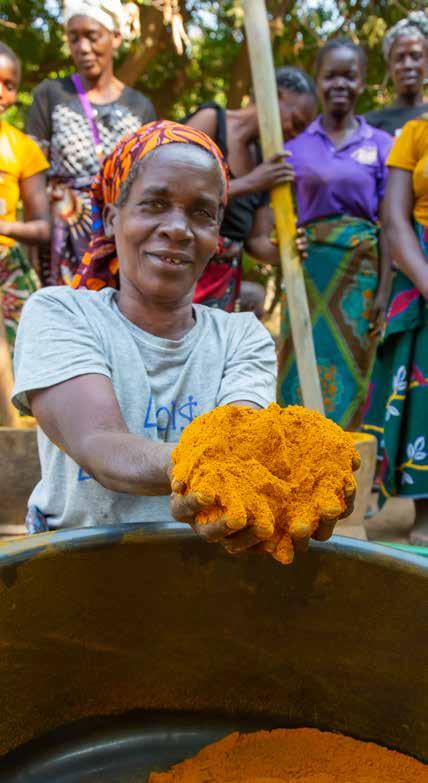
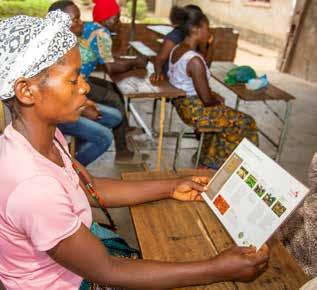
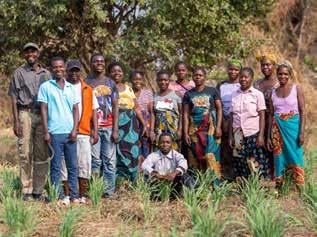
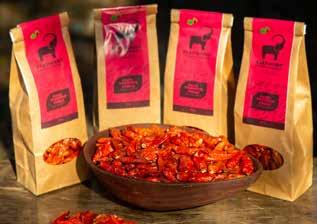
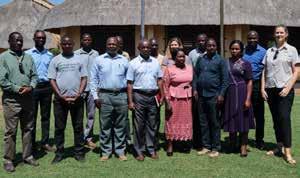
Knowledge exchange amongst various stakeholders, both at the local and national levels, as well as with partners in neighbouring countries and beyond, is important in enhancing the effectiveness of strategies to mitigate HEC.
In addition to a two-part farmer exchange visit, CSL HWCx, ZCP and DNPW staff travelled to Rumphi in Malawi to participate in a workshop on HWC alongside counterparts from Nyika National Park and Vwaza Marsh Wildlife Reserve. Following the Malawi workshop, CSL’s Malawi colleagues, alongside Dr Eva Gross, an expert in human-wildlife coexistence, visited Mfuwe to learn more about CSL’s work.
Throughout the year, the HWCx team also participated in quarterly stakeholder meetings. These meetings unite all parties involved in improving human-wildlife coexistence in South Luangwa.
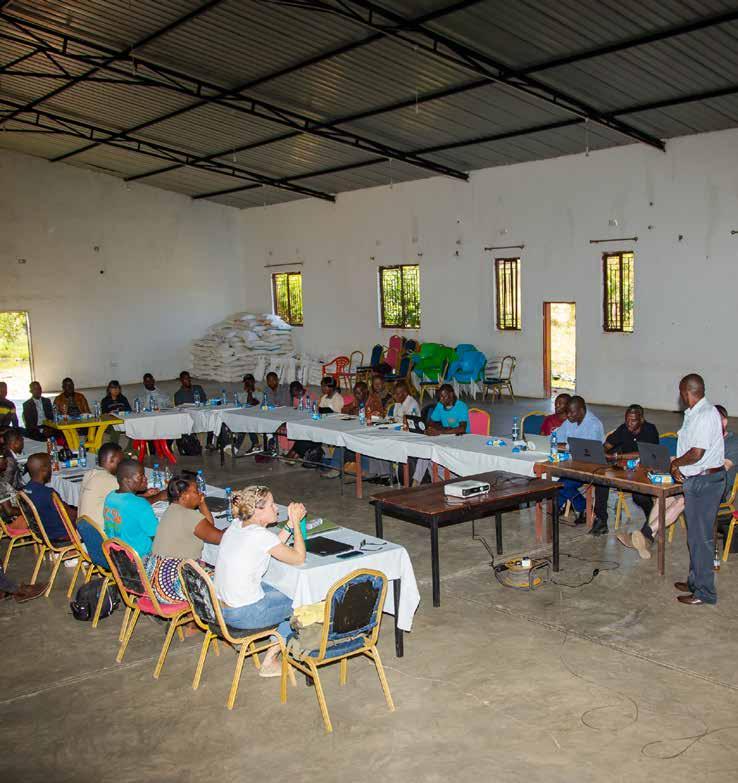
Before the introduction of HWC stakeholder meetings, I did not know where to report HWC issues, or what mitigation measures to use. When the stakeholder meetings started in 2021, they provided a platform to share HWC ideas and find ways of resolving the problems of HWC in our community together.
I urge all stakeholders, especially community resource boards, to take these meetings seriously if we are to reduce HWC issues in our chiefdoms. If we don’t then this could mean less harvest due to crop damage, more injuries or deaths, increased livestock predation and property damage.
BENSON PHIRI Ncheka Ward Councillor, Mnkhanya ChiefdomTo a great extent, 2023 has been a successful year for anti-poaching law enforcement in South Luangwa.
We proudly welcomed 20 new community scouts to our ground patrol units, the first recruits in over two years, strengthening our scout force in the fight against wildlife poaching. The community clean sweep programme not only significantly increased snare retrieval but also encouraged community participation in vital conservation work. Looking to 2024, our focus is on sustaining this momentum. This objective is expected to be made easier with the arrival of new vehicles for patrol deployments, one of our primary challenges in 2023.
The K9 Unit celebrated operational achievements, including the arrival of two new dogs, training opportunities for handlers, and excellent anti-poaching results. The delivery of a new K9 vehicle at the end of the year also bolstered our resources. Next year we are pleased to be celebrating the 10th anniversary of the K9 Unit.
Our Aerial Unit continues to play an increasingly important role in all aspects of CSL’s work, supporting ground patrol units, helping with veterinary work and contributing to community programmes. We look forward to more successes and impactful results from the Aerial Unit in 2024.
The overall strong performance in 2023 can be attributed to the collaborative work between CSL, DNPW and support from Working Dogs for Conservation (WD4C), who not only contributed to positive results but also provided a morale boost to our law enforcement teams.
 Benson Kanyembo Law Enforcement Advisor and 2019 Tusk Wildlife Ranger Award winner
Benson Kanyembo Law Enforcement Advisor and 2019 Tusk Wildlife Ranger Award winner
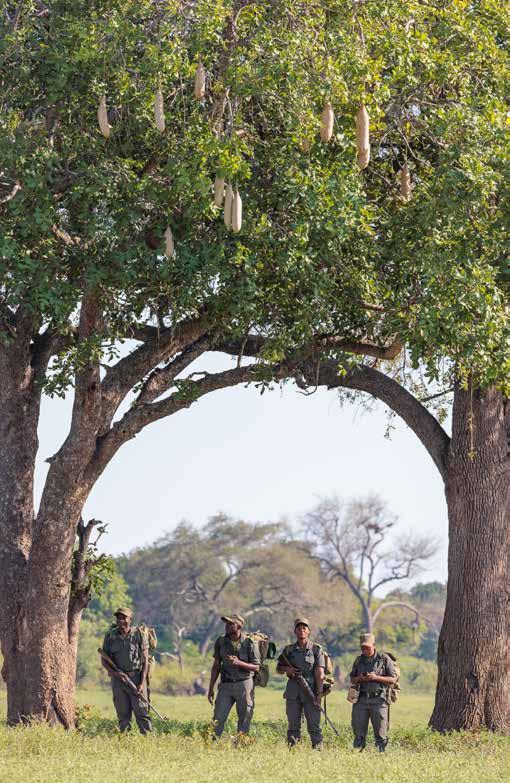
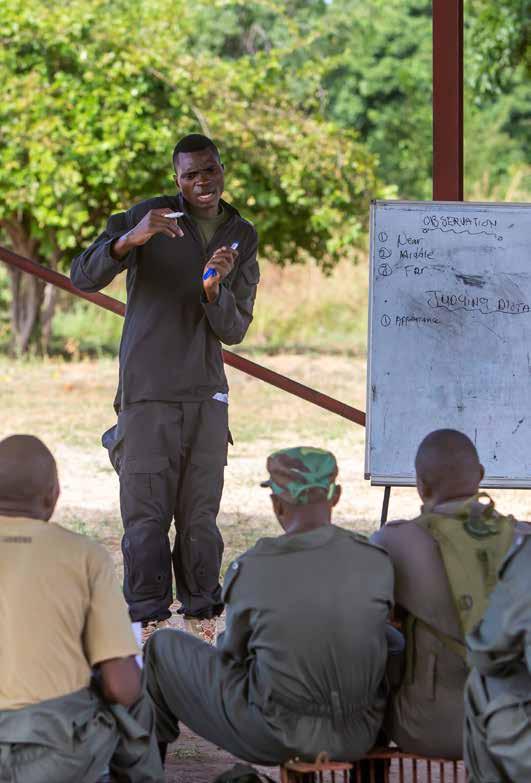
During 2023, Frontier continued its long-standing collaboration with CSL. One significant development project was to re-certify the elite Quick Reaction Force (QRF) teams and add manpower to replace those that moved to other teams.
The programme provided concentrated up-skilling and team development training, based on operational needs determined through detailed analysis. The programme enhanced the operational effectiveness of the teams, bringing on board multiple new members, as well as developing existing members in line with dynamic operational changes.
In addition, Frontier conducted target team conceptual and practical development. This included integrating members from all over the Eastern Province from DNPW Intelligence and Investigation units, to undertake integrated intelligence-led targeting operations.
The impact of the QRF and target teams remains notable, both for the outcomes when conducting operations, but also for their perception and deterrent effect. Frontier is proud to continue its partnership with CSL into 2024 to further develop the teams capacity and strategic programming.
 Tom Whittle Frontier Strategy Director
Tom Whittle Frontier Strategy Director
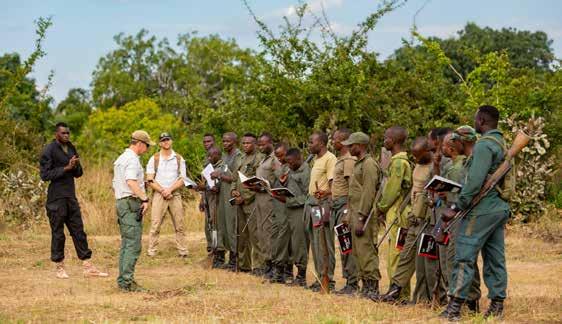
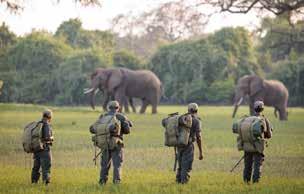
Throughout the year, CSL and DNPW combined antipoaching foot patrol teams covered 52,556 km to find and deter illegal activity in the South Luangwa National Park and surrounding game management areas. Patrol teams conducted 814 field days, of which 329 were day patrols, 19 five-day patrols and 466 10-day patrols. The teams achieved the following results:
• 316 wire snares recovered
• 82 firearms seized
• 500 kg illegal bushmeat confiscated
• 683 kg ivory removed from circulation (103 kg confiscated from suspects and 580 kg retrieved from carcasses)
• 150 wildlife crime suspects apprehended
• 120 poachers’ and fisherman camps’ detected
• 132 drying racks observed
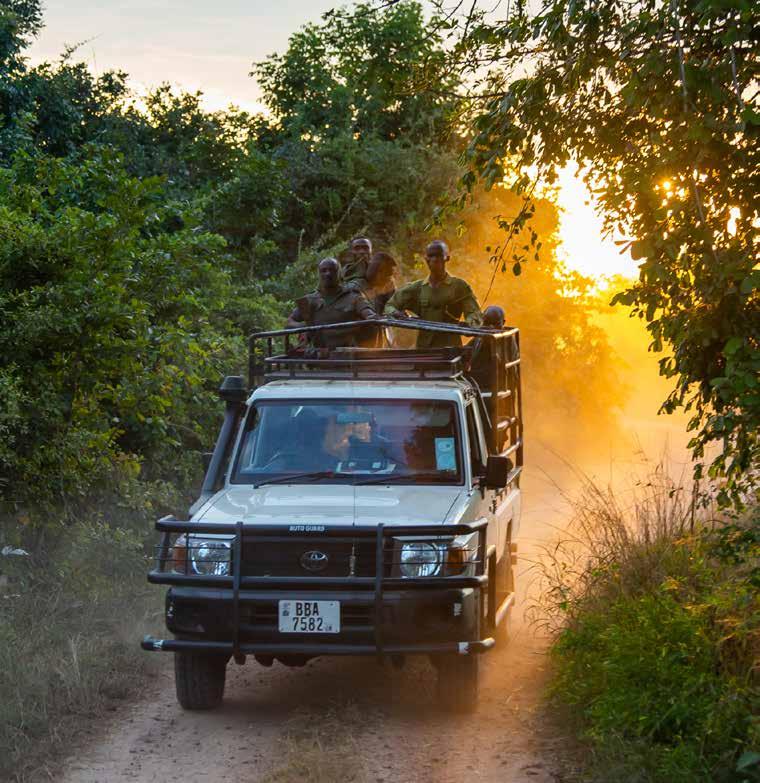
A remarkable 57% of the total recovered snares in 2023 were found during regular community anti-snaring clean sweeps. CSL conducted an impressive 236 clean sweep operations, a substantial 131% increase from 2022, with 1,409 community members participating and recovering 412 snares.
Initiated three years ago by CSL and ZCP, the community clean sweep programme aims to increase antisnaring patrols and support the household incomes of participating community members. Led by a CSL Scout and DNPW Wildlife Police Officer, each sweep consists of five or six community members and are carried out in known snaring hotspots.
Beyond their impact on snare removal and household incomes, the community clean sweeps also engage communities in conservation efforts, and their consistent presence in South Luangwa serves as a deterrent to potential poachers.
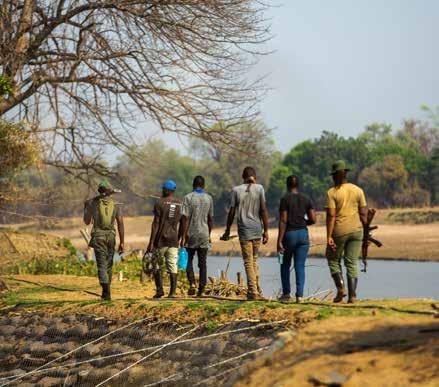
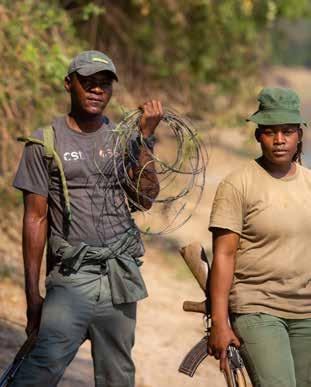
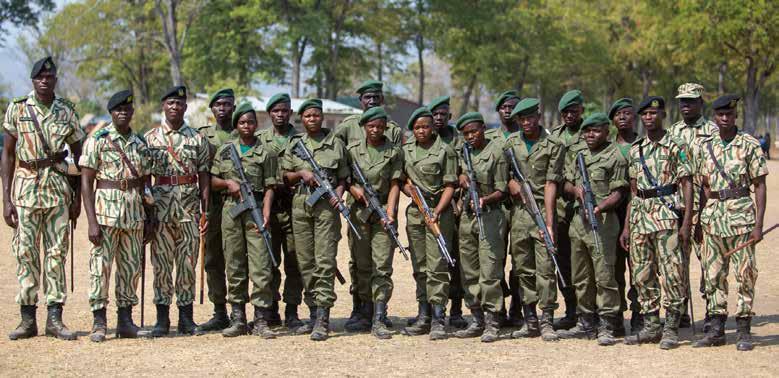
This year, 15 men and five women graduated from DNPW Nyamaluma Wildlife Training School. Their three-month intensive programme incorporated HWC and mitigation measures; ecology and ecosystem management; capture, arrest and weaponry, as well as field-based skills, such as field survival and GPS mapping. Certificates were presented by Mambwe District Commissioner, William Banda. An impressive marching band accompanied the new recruits’ parade, which featured drill and arms handling demonstrations, and martial arts and cultural performances. The CSL community scout force now has 108 trained officers working to protect the wildlife and habitats of South Luangwa.
In 2023, the K9 Unit continued to refine operations across Zambia’s Eastern Province. CSL saw an overall 22% reduction in operations compared with 2022. This is attributed to a focus on strategic, intelligence-led deployment of patrols. As a result of this strategic shift, there was an increase in arrests, firearms confiscations and bushmeat seizures by the K9 Unit when compared to 2022.
CSL continued to prove the efficiency and effectiveness of the K9 Unit in 2023, with results representing 24% of the total wildlife crime suspects apprehended by CSL/ DNPW anti-poaching units, as well as 29% of firearms confiscations and 59% of bushmeat seizures.
Nine K9 handlers and six working dogs conducted 154 operations across Zambia’s Eastern Province and along the Zambia-Malawi-Mozambique border. These operations included 15 random and quick checkpoints and the establishment of 98 half-day or full-day roadblocks on known trafficking routes. The team searched 14,365 vehicles (6,220 motor vehicles, 4,133 bicycles, and 4,012 motorbikes) and carried out 25 intelligence-led property searches. From these operations, the K9 Unit reported the following results:
• 47 wildlife crime suspects arrested, an increase of 27% compared with 2022
• 33 firearms confiscated, an increase of 18% compared with 2022
• 724 kg of illegal bushmeat seized, a significant increase of 341% compared with 2022
• 28 kg ivory confiscated from suspects
• The confiscation of one leopard skin and five Sharpe’s Grysbok skins
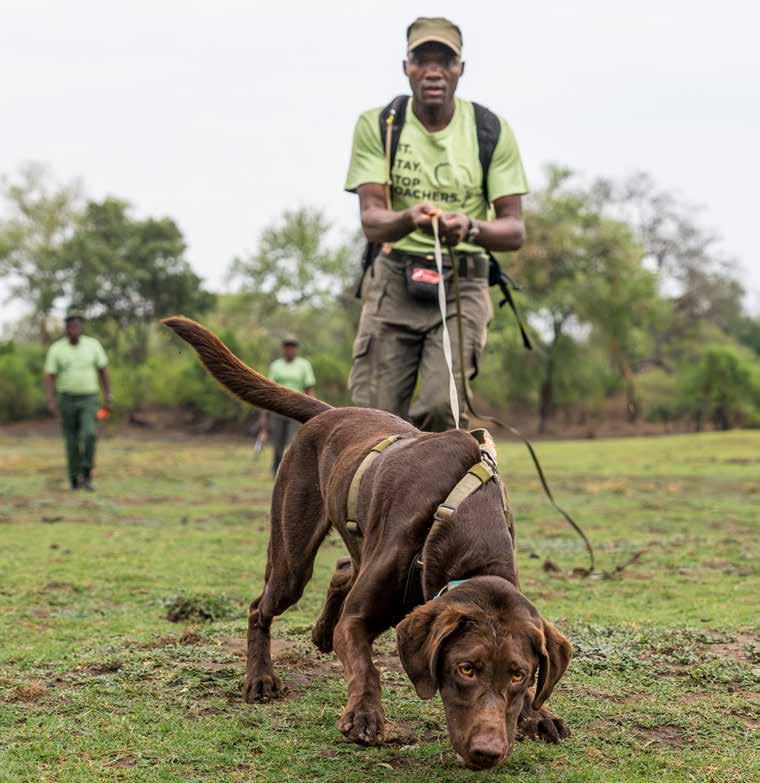
CSL’s partnership with WD4C continues to develop the K9 Unit. Four K9 handlers - Godfrey Mwanza, Sydney Njobvu, Mike Njobvu and Collins Lifumbo - carried out an intensive training programme in Montana and Seattle, USA. The programme included a dog-centred detection workshop, a K9 handler first aid training course, and a workshop on training chickens and applying this knowledge to canine teaching. The handlers also gained insights from bomb-sniffing dogs and handlers at a football stadium and gave a presentation about CSL and DNPW’s work to Woodland Park Zoo staff and volunteers.

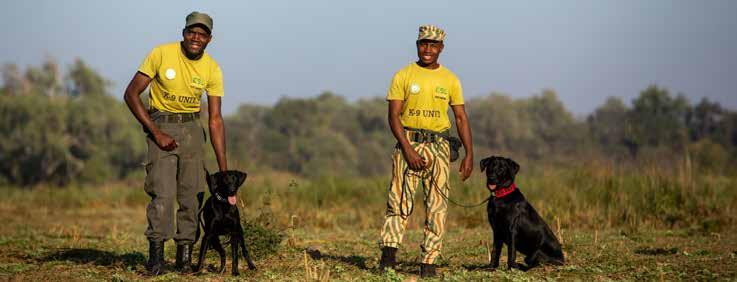
CSL was pleased to welcome Ody and Cassi, two Labrador working dogs, into the family to help in the fight against wildlife crime. Ody was donated to the WD4C programme in the USA by Folklore Canine in Alabama in March 2022 and Cassi was donated to WD4C in April 2023 by a game warden in Texas.
Following the arrival of Ody and Cassi in Mfuwe, CSL carried out a training programme with Lauren Wendt, Law Enforcement Training Specialist, and Paige Smith, Canine Field Specialist. The focus was on tracking and detection scenarios, obedience training, play, fitness, and enhanced understanding of the health, welfare, and husbandry needs of the dogs. Continuous skills development ensures CSL’s dogs remain enthusiastic and efficient in their roles.
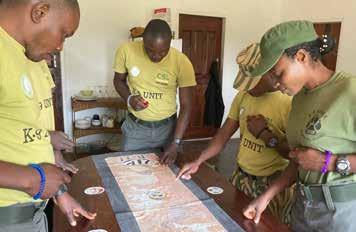

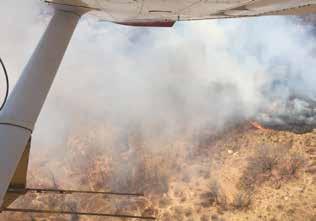
The Aerial Unit has evolved to become a significant contributor in safeguarding the South Luangwa ecosystem, contributing not only to anti-poaching law enforcement, research and monitoring but also supporting various other activities. These activities include mapping water points for patrol teams, assisting the HWCx team in monitoring and planning crop damage mitigation measures, and flying with local chiefs to enhance their understanding of CSL’s conservation efforts.
In 2023, the aerial team recorded the following:
• 165 hours in support of anti-poaching efforts on 75 patrols dedicated to aerial surveillance and 19 flights with dual objectives
• 11 individuals suspected of illegal entry into the Park
• 27 elephant carcasses
• 19 buffalo, giraffe and hippo carcasses
• Seven incidents of illegal fires
• Three illegal instances of tree cutting in the Park
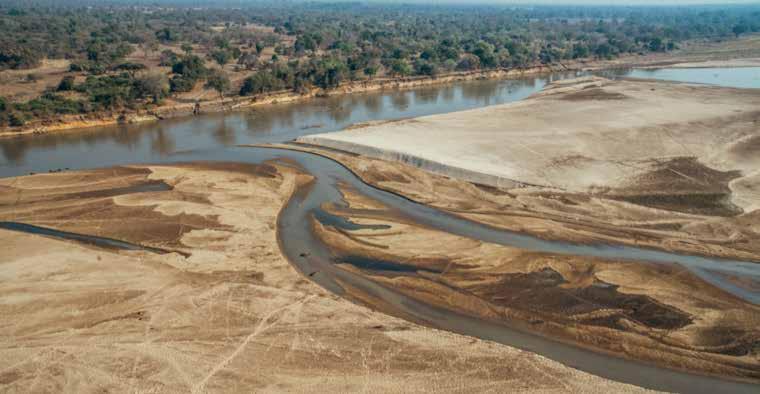
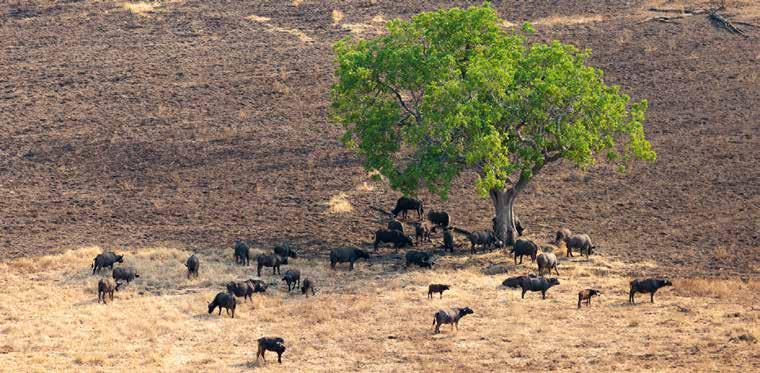
CSL’s fixed-wing Cessna 180 aircraft plays a crucial role in supporting law enforcement through aerial surveillance operations, while also contributing to ZCP’s large carnivore research via aerial tracking operations. As a mode of transport, it also enables effective resource management. During the dry season, the aircraft enables patrols to be completed in a fraction of the time it would take the groundbased team. In the wet season, it becomes essential for surveillance where ground access is limited. The aircraft provides real-time intelligence to ground responders to incidents of gunshots and other illegal activity detected from the air, such as poachers’ camps and drying racks. In addition, the aircraft acts as a deterrent to potential poachers by providing a consistent presence along Park boundaries and around sensitive areas. Furthermore, the nature of flying means that CSL-ZCP Veterinarian, Dr Mwamba Sichande, can attend to de-snaring needs in more remote areas without the need for extensive days travelling across remote areas.
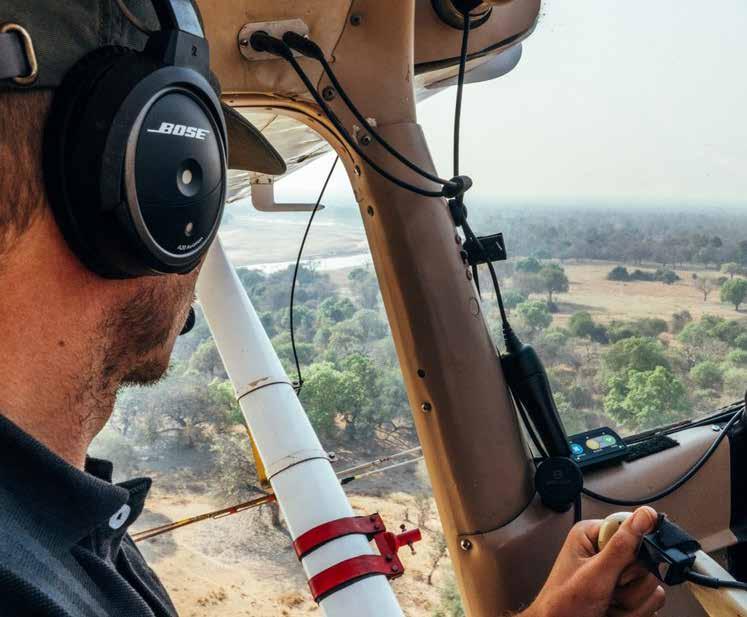
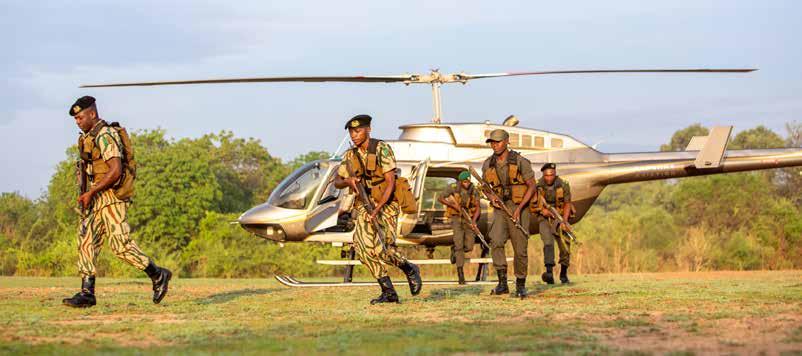
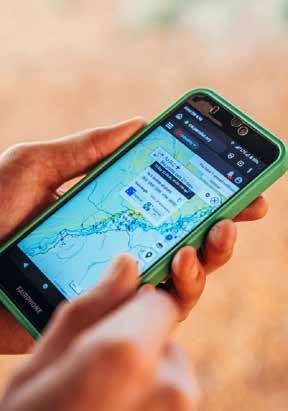
The success and benefits seen with helicopter support for anti-poaching in 2022 continued into 2023 with 71 operations over 121 flying hours, covering 14,275 km. The capacity for rapid deployment of the groundpatrol team, in particular for the QRF teams, has been invaluable to law enforcement throughout the year. In addition, alongside the Cessna 180, the helicopter provides a major deterrence factor to poachers as well as a morale boost for teams on the ground, particularly those based in remote scout camps that can be inaccessible by road during the rainy season.
Over the years, our evolving partnership with DNPW, Zambia’s Ministry of Livestock and Fisheries and ZCP, has enabled us to effectively respond to wildlife rescues and disease outbreaks. This was demonstrated in 2023 when we collaborated with ZCP and DNPW Veterinarian, Dr Lengwe Bwalya, to successfully rescue 15 animals.
Additionally, our collaboration with the Ministry of Livestock and Fisheries allowed us to expand the coverage of rabies vaccinations for both dogs and cats. By extending our reach in rabies vaccinations, we not only contribute to a healthier domestic animal population but minimise the potential threat of disease transmission to South Luangwa’s wildlife.
On a personal note, I had the privilege of partnering with vets from the USA and Japan to support Visiting Vets International in sterilising dogs in Cambodia. I also gained valuable insights and experience through a neuroscience externship programme in Israel.
As we move into 2024, I look forward to building upon the successes in 2023.
 Dr Mwamba Sichande CSL-ZCP Veterinarian
Dr Mwamba Sichande CSL-ZCP Veterinarian
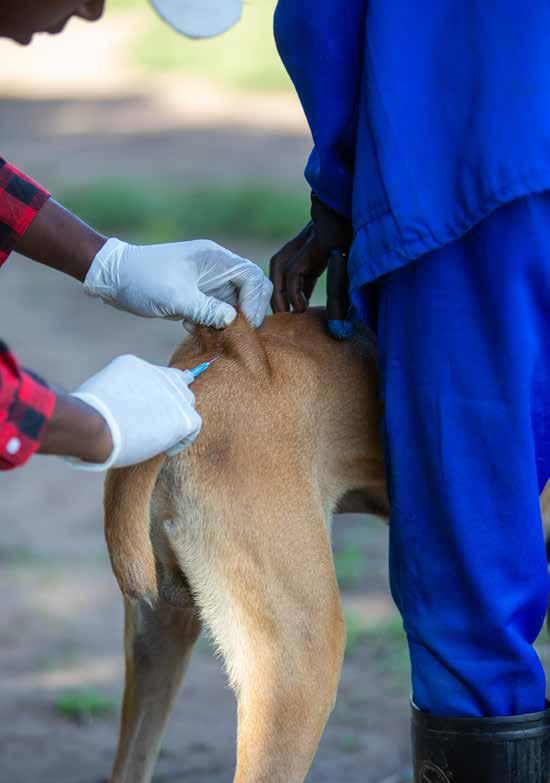
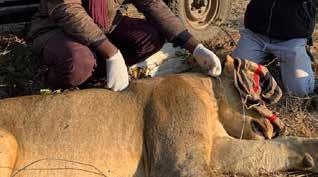
Snares are indiscriminate killers, endangering many wildlife species. This year, CSL’s veterinary team de-snared 11 animals. The seasonal trends seen over recent years continued in 2023, with snaring peaking in Zambia’s driest months where access to the protected area is easiest and farming activities are at their lowest. June and September saw the highest number of animals de-snared in any month. Sadly, 2023 saw the first reports of snared lions in South Luangwa since July 2021. In total, four elephant (including two calves), two giraffe, two lion, two wild dog, and one baboon were de-snared. Unfortunately, one of the de-snared wild dogs succumbed to horrific injuries caused by the snare.
In addition to de-snaring activities, four animals were rescued – two elephants stuck in soakaways, one orphaned elephant calf (successfully translocated to the Game Rangers International elephant orphanage in Lusaka) and one giraffe with a stillborn foetus.
These de-snaring and rescue activities were carried out in collaboration with DNPW, conservation partners and local safari operators. CSL takes pride in being part of a network of dedicated and passionate organisations, collectively working to protect the South Luangwa ecosystem.
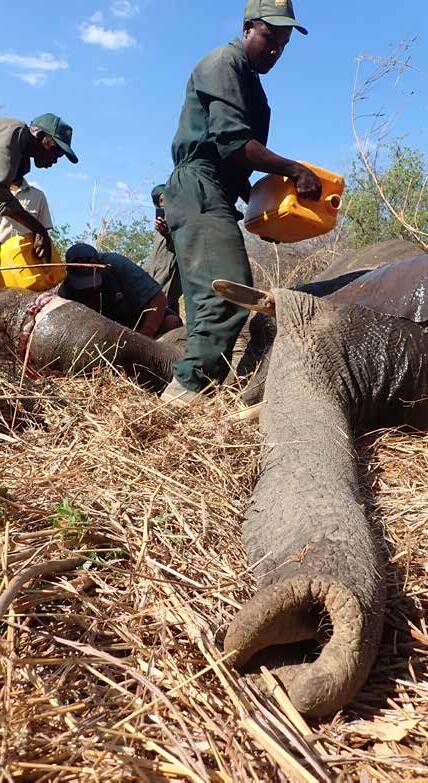
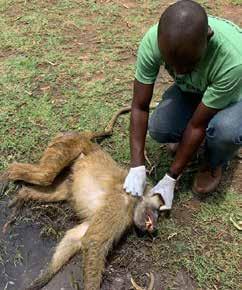

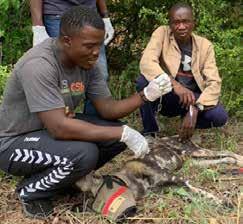
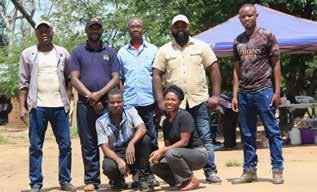
In 2023, CSL continued to provide free veterinary care for domestic animals living along the boundary of the South Luangwa National Park.
The veterinary team treated 212 animals in the Mfuwe clinic and had some unusual cases, including treatment for a python entangled in a fishing net, and the removal of a fishing hook swallowed by a dog. These in-clinic cases are an increase of 108% compared with 2022.
The veterinary team also carried out 19 community outreach visits and treated 459 animals. CSL’s community outreach work continues to grow each year as more communities welcome the veterinary team.
During the year, 44 animals (30 dogs and 14 cats) were sterilised and 581 dogs and cats were vaccinated against rabies. These services are not only important for the welfare of domestic animals but also play an important part in CSL’s wider conservation mission.
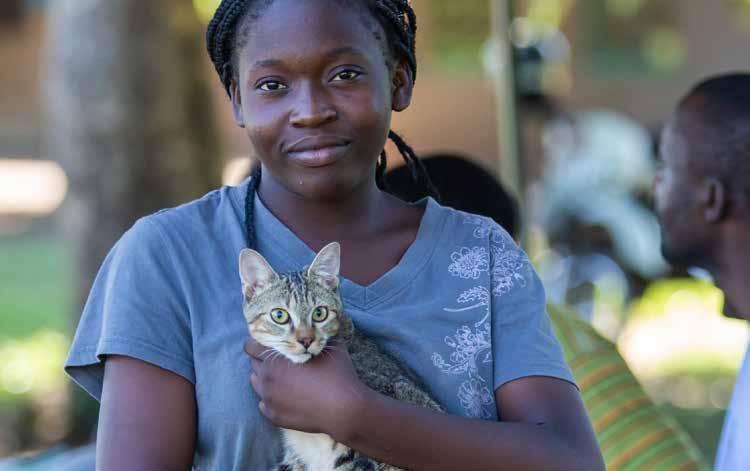
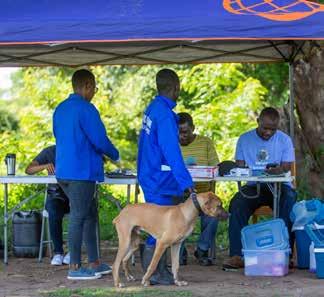
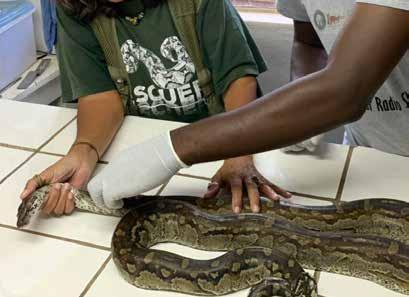
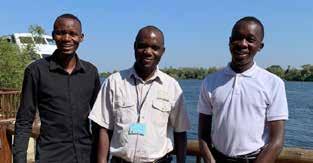
This year, Dr Sichande travelled nationally and internationally to represent CSL’s work and build on his skills and experience. These trips not only enhance his ability to provide advanced care for wild and domestic animals in the Luangwa Valley but also aid in being recognised as a valuable contributor to the broader field of veterinary medicine in Zambia and beyond. Throughout the year, Dr Sichande:
• Teamed up with Visiting Veterinarians International to support Paw Patrol Cambodia with a spay-neuter campaign.
• Participated in a Regional Conference and Annual General Meeting of the Veterinary Association of Zambia.
• Engaged in a neuroscience externship programme at the Koret School of Veterinary Medicine in Israel, where he was invited by Professor Merav Shamir, Associate Professor in Veterinary Neurology and Neurosurgery at the University of Jerusalem. Dr Sichande observed surgeries at the Veterinary Teaching Hospital and examined microscope slides in the Veterinary Neurobiology Lab.
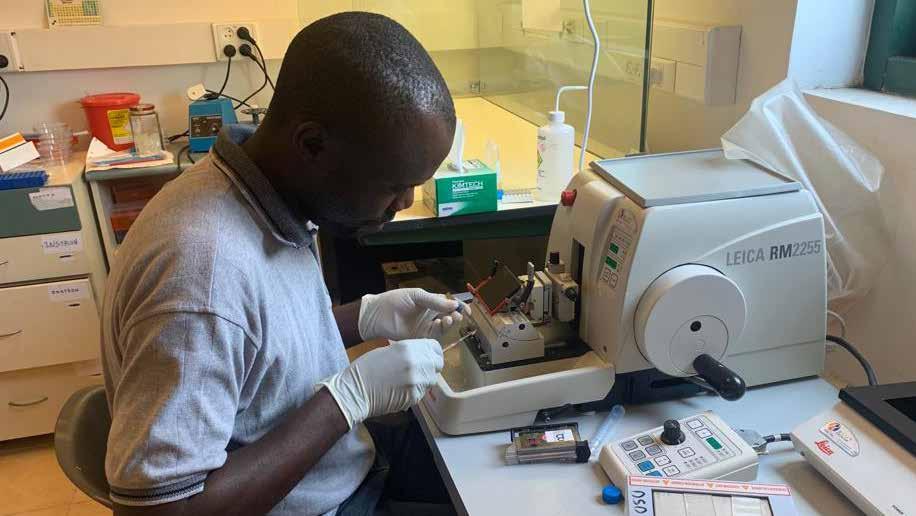
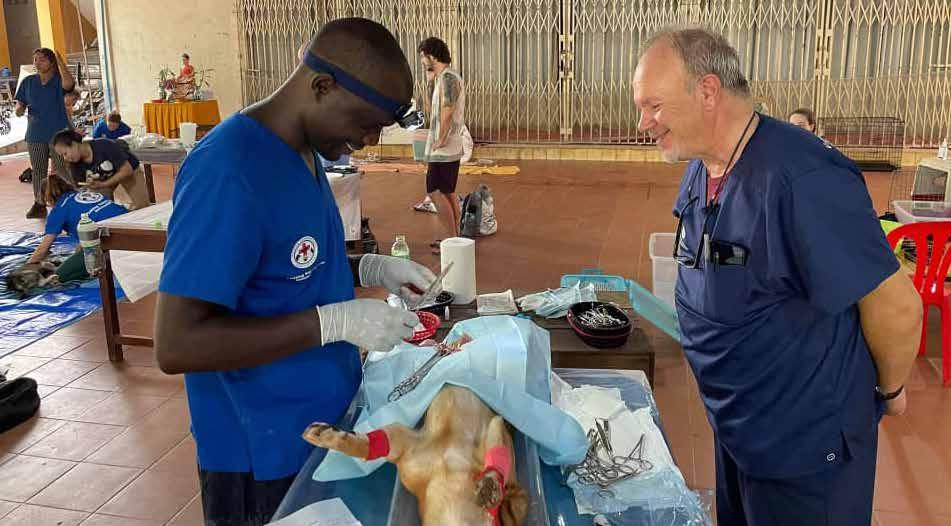
In 2014, Dr Sichande established a veterinary mentorship programme to support the next generation of veterinarians. He provides national and international students with detailed insight into his veterinary work and shares the essential skills required to be a vet in a challenging and remote area of Zambia.
In 2023, Dr Sichande mentored four Chipembele Wildlife Education Trust Aspiring Conservation Leader students, two veterinary students from the University of Edinburgh in the UK and a University of Zambia veterinary student, Dr Cornellius Phiri, who is now a certified veterinarian.
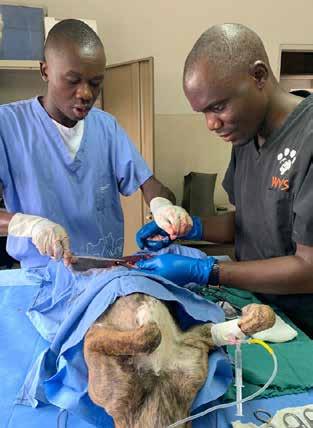
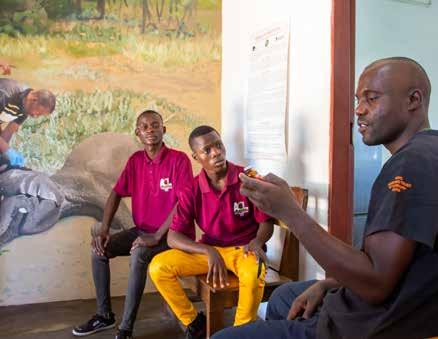
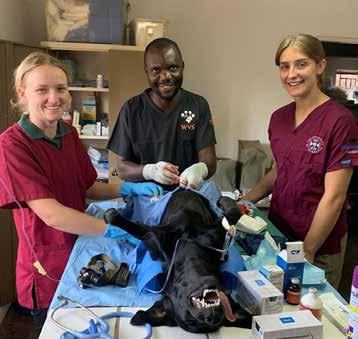
My primary education was made possible with the support of my parents. However, after completing Grade 12 in 2015 with distinctions in all subjects, I faced a lack of sponsorship for further education. Fortunately, financial assistance from Catholic priests enabled me to travel to Lusaka, where I applied for a government scholarship to study Veterinary Medicine at the University of Zambia.
During my time in Lusaka, I established myself as a private tutor, providing support to young students to sustain my stay in the city. Successfully securing a government scholarship, I enrolled at the University of Zambia in 2018. The income from private tuition covered my accommodation expenses. However, by the third year, balancing tuition work with university studies became challenging. In my search for alternative financial support to continue my veterinary degree, I reached out to Remote Africa Safaris, who suggested contacting CSL. This led to CSL providing financial assistance in 2020, and their support has continued over the last three years. Currently interning with CSL and ZCP, I look forward to providing updates on my career in the coming years.
DR CORNELLIUS PHIRIAn inspirational success story
By harnessing cutting-edge technology, CSL teams gain invaluable insights into threats facing biodiversity. Looking ahead, technology is set to play an even more transformative role in conservation. In 2023, CSL enhanced the technological skills of current staff and the next generation of conservationists, marking a significant step in CSL’s tech-enabled conservation journey.
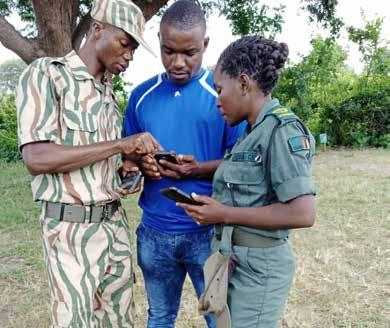
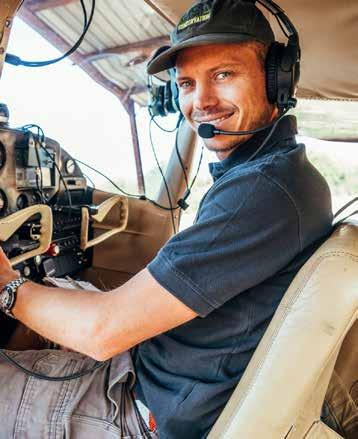
This year, I took on additional responsibilities as Conservation Technology Manager. Over recent years, advancements in technology related to law enforcement, together with increased focus from technology giants, have made industryleading hardware and software increasingly affordable. As a result, these technologies are more accessible and practical for use in remote and rough terrains such as South Luangwa.
In 2023, we mounted a camera with a remote release system to one of the wings of our aircraft, enabling us to take high-quality aerial images of illegal activity, such as bushmeat drying racks, poachers’ camps, wildlife carcasses, and incidences of deforestation. These images are then attached to reports to strengthen evidence and bolster intelligence. The images can also remove the need for on-the-ground follow-up and determine what might or might not have been detected.
I look forward to helping CSL to innovate and grow in this new field alongside my daily aerial surveillance work.
In 2023, CSL recruited Jeremiah Daka Bwalya as SMART Data Assistant to support Kaluba Tembo, SMART Coordinator. Jeremiah’s responsibilities include data cleaning and error correction, liaising with data collection field officers and keeping track of their equipment. Towards the end of the year, Jeremiah trained 62 trainee scouts in how to use SMART and EarthRanger.
Throughout the year, field officers, volunteers, CSL scouts and DNPW rangers were trained on new features in SMART 7, which records patrol locations, outcomes such as arrests and snares removals, and key wildlife data. This software also helps to assess coexistence challenges in South Luangwa, demonstrate the effectiveness of HWC mitigations, and map shifts in conflict patterns. EarthRanger enhances operations by providing real-time scout location tracking and directing them to resources such as water.
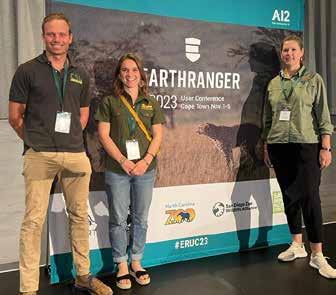 GARETH BROEKHUIZEN CSL-ZCP Pilot and Conservation Technology Manager
GARETH BROEKHUIZEN CSL-ZCP Pilot and Conservation Technology Manager
Emma Robinson and Gareth Broekhuizen attended the annual EarthRanger User Conference in Cape Town. This global event brought together 484 conservationists, technologists and scientists from 44 countries across six continents, and facilitated in-depth discussions on innovative solutions to urgent conservation challenges. Gareth took to the stage to share his insights during a session focused on advancements in aerial monitoring and survey techniques.
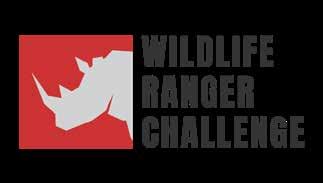
CSL was pleased to take part in the Tusk Wildlife Ranger Challenge. This annual event is an opportunity to recognise the critical role of rangers in the conservation of protected areas.
With the incredible support of donors, CSL topped the fundraising leaderboard once again, raising $299,179 for rangers on the frontline of conservation in South Luangwa.
CSL was proud to learn that its Atsikana (women) team won the women’s Wildlife Ranger 21 km Challenge. A team of four determined, strong women ran the distance in two hours and 45 minutes. They ran across demanding terrain whilst carrying backpacks weighing 10 kg (22 kg for men). CSL’s Azibambo (men) team also did well with a time of two hours and 28 minutes which placed them sixth on the leaderboard. Over 100 ranger teams participated in the 21 km Challenge in September.
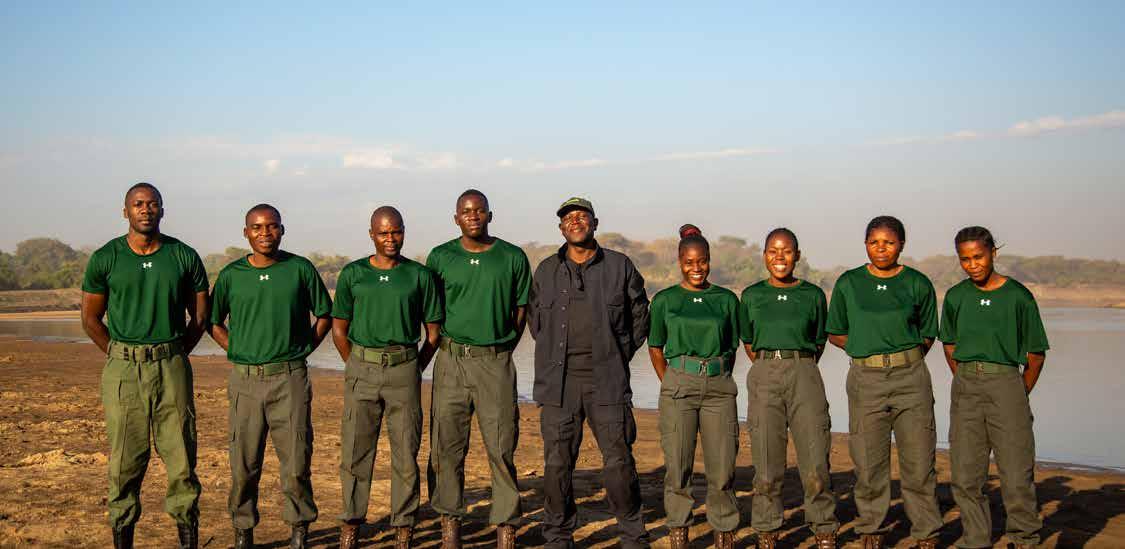
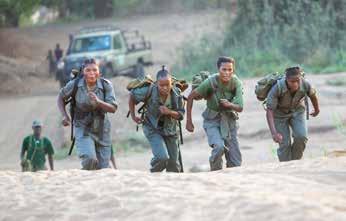
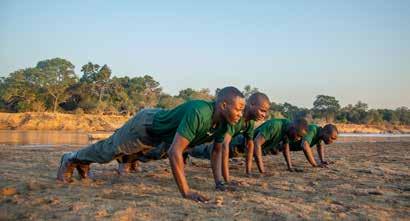
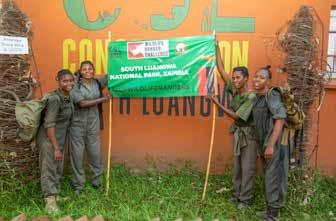
Following a three-year break due to the Covid-19 pandemic, the CSL Fun Run made a triumphant return in June. CSL was pleased to see so many members of the local community, supporters and partners enjoy a fun-filled day of sporting activities. More than 6,000 people took part in a wide range of activities on the grounds of Mfuwe Airport.
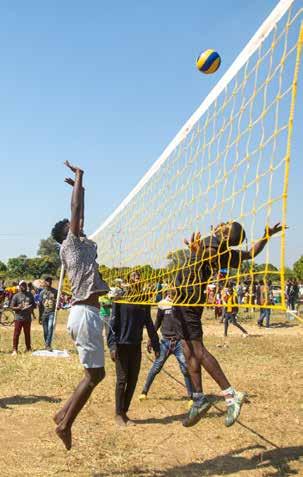
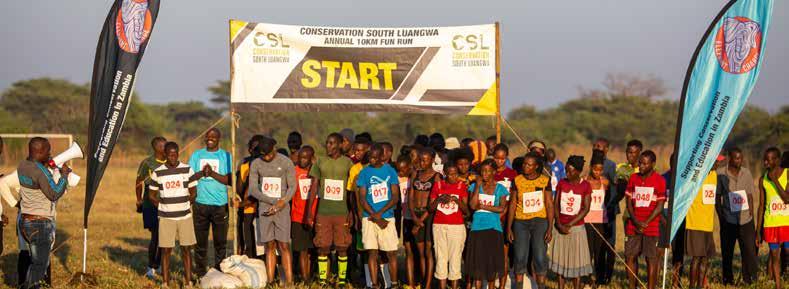
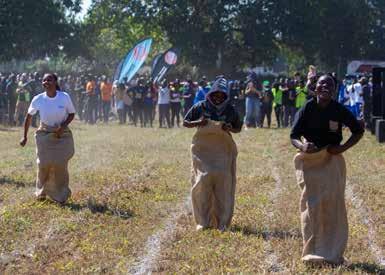
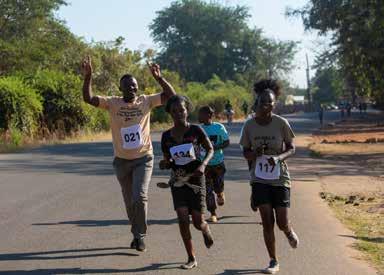
The day began early with a 10 km run which Ester Beza from the CSL HWCx team ran in only 50 minutes. New for 2023 was a 20 km run to celebrate CSL’s 20th anniversary. Other activities included a 50 m sack race and egg and spoon race, as well as a 100 m three-legged race and sprint. The Zambia Air Force won the tug-of-war in the final against Zambia National Airports. It was great to see the enthusiasm from teams as they took part in volleyball, netball and ZCP football tournaments too. Other highlights were lively performances from the SEKA theatre group and other traditional dances. The event concluded with a speech from the District Commissioner and the distribution of prizes. The day was an opportunity to unite in celebration and recognition of conservation efforts in South Luangwa.
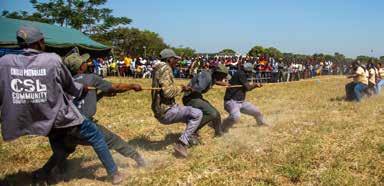
I can scarcely believe I am writing this, but this year CSL celebrated 20 years of grassroots conservation across the South Luangwa ecosystem. In reality, the CSL journey began a few years before this when myself and a group of other passionate conservationists working in tourism in the area came together to help fund a small team of six scouts to support DNPW (then known as Zambian Wildlife Authority or ZAWA). This work was formalised with our first injection of funding, allowing the recruitment and training of 30 scouts in 2003 and our official registration as South Luangwa Conservation Society.
I could never have imagined that, over 20 years later, we would be DNPW’s longest-serving conservation partner in South Luangwa. CSL is now an organisation employing 137 people, supporting wildlife and habitats across 1.4 million hectares of protected area. Each year, we deploy hundreds of ground and aerial patrols as well as Zambia’s first conservation K9 Unit. We also provide year-round wildlife rescue and community outreach, led by Zambia’s only full-time veterinarian employed directly by an NGO. On top of that, our human-wildlife coexistence programmes have grown to support thousands of community members surrounding the South Luangwa National Park with vital conflict mitigation strategies, including Zambia’s only dedicated human-wildlife conflict Rapid Response Unit on call 24/7 to help de-escalate incidents of severe conflict to support both community and wildlife to peacefully coexist.
To achieve all this year on year, we rely on the support of individuals, businesses and grant-giving bodies from across the world and we continue to be astounded by the generosity and passion shown for our work. I hope that our work continues to grow and develop at the same rate over the next two decades and that this extraordinary corner of the world remains a pristine, untouched wilderness where animals and people alike can not just survive, but truly thrive.
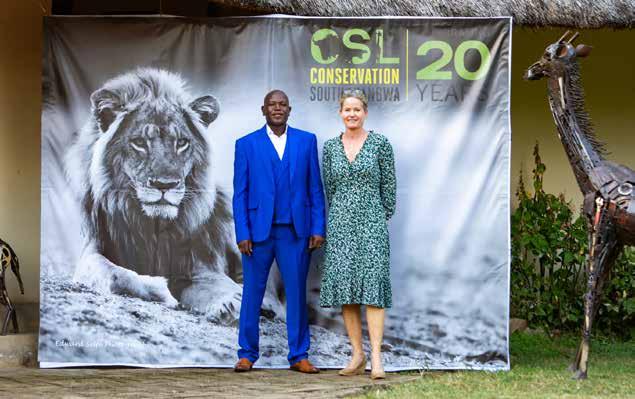
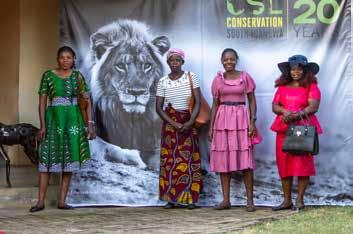 Rachel McRobb CSL CEO and Co-Founder
Rachel McRobb CSL CEO and Co-Founder
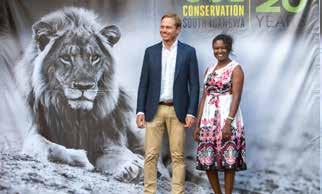
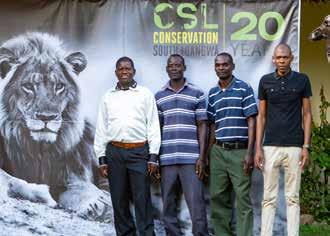
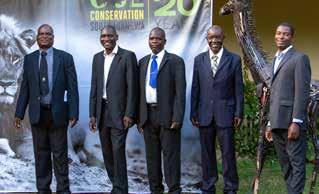

• From one to 20 human-wildlife conflict team members
• 9,000+ human-wildlife conflicts assessed
• 10 conflict mitigation strategies trialled across seven chiefdoms
• 3,700+ chilli farmers trained
• Three alternative crop products developed
• 67 tonnes of chilli harvested/bought
• 5,827 local people taken into the South Luangwa National Park on 730 game drives
• 131 SEKA theatre performances held in the community
• 90 Conservation Hour radio broadcasts
• From 30 to 108 CSL community scouts
• From one to 20 vehicles deploying/extracting ground patrols plus three boats, one aircraft and five motorbikes
• 8,500+ foot patrols
• 2,300+ aerial surveillance hours
• 350+ helicopter support hours
• 300+ animals rescued
• 2,000+ domestic animals rabies vaccinated
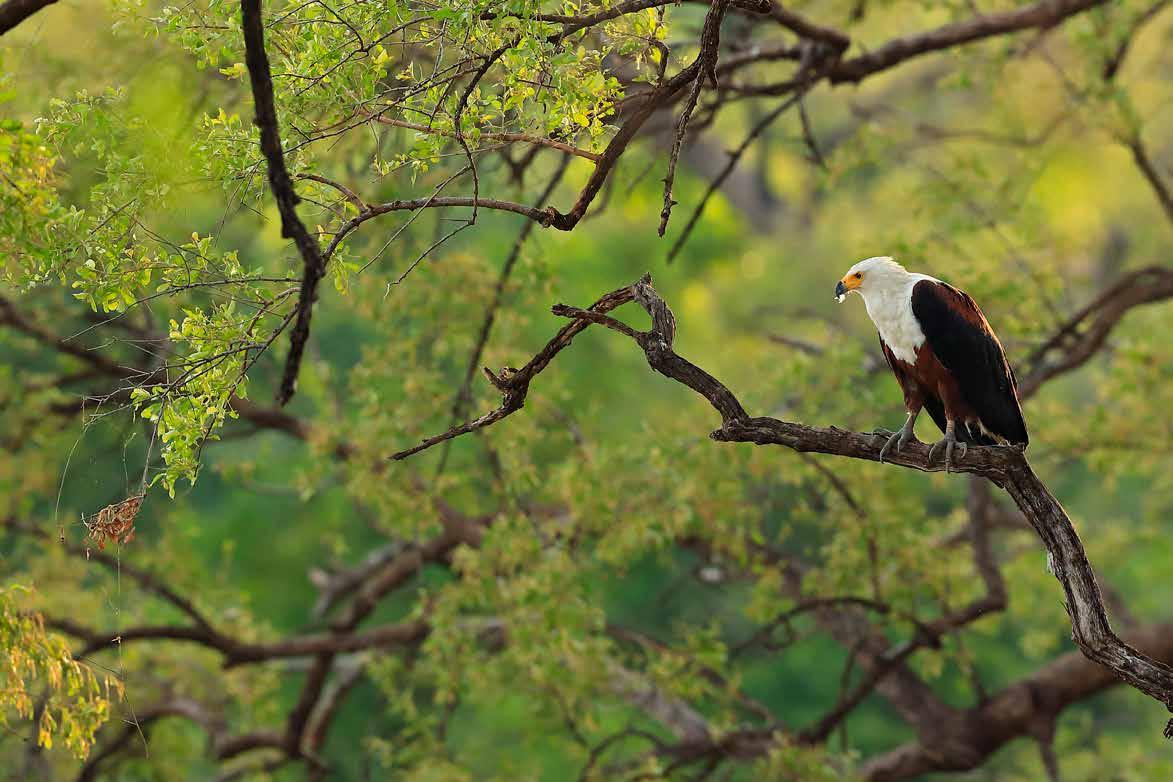
• Nine K9 Unit dogs, nine handlers
• 1,000+ roadblocks
• 112,000+ vehicles searched
• 2,000+ wildlife crime suspects arrested
• 12,000+ snares recovered
• 1,000+ firearms confiscated
• 11+ tonnes of bushmeat confiscated
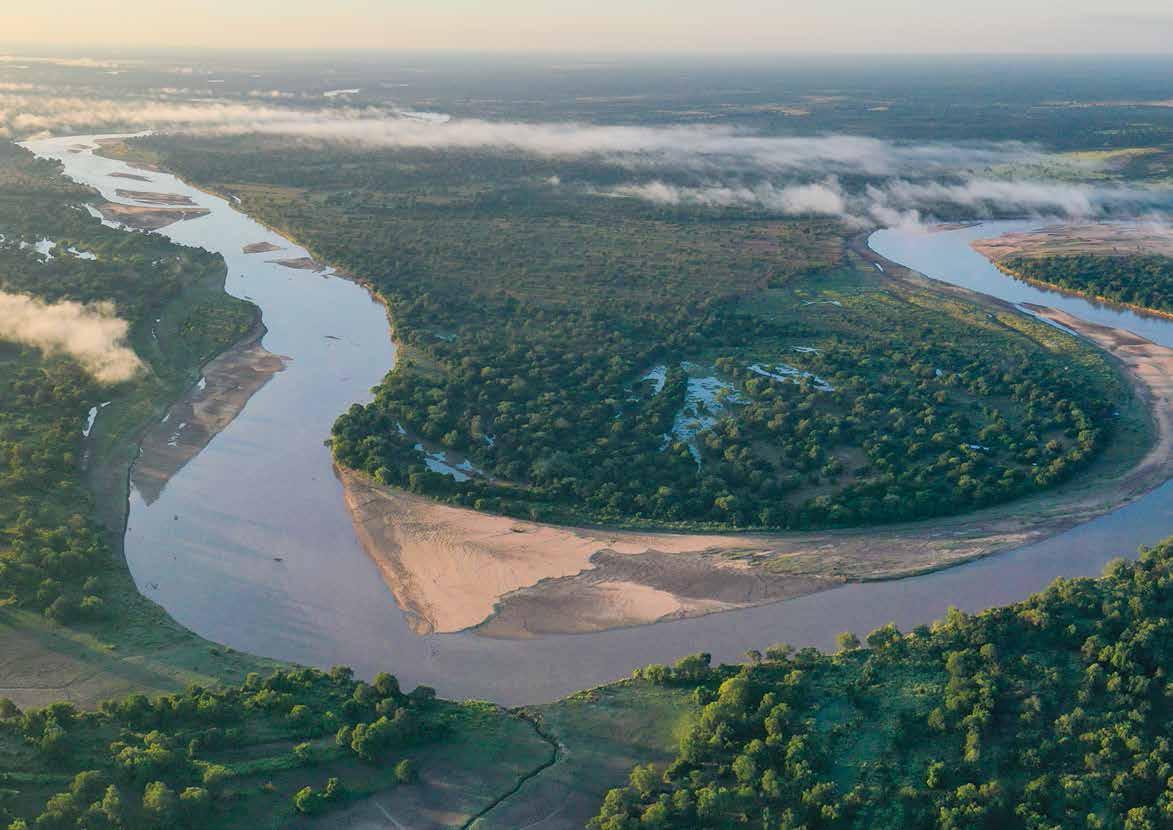
2003
SOUTH LUANGWA CONSERVATION SOCIETY
South Luangwa Conservation Society is officially registered, transforming from a small, ad-hoc local task force of six scouts to a formally endorsed anti-poaching unit of 30 trained community scouts and base camp in Mfuwe.
2006
An official alliance with the Kakumbi Community Resource Board begins and a second major recruitment drive for scouts is complete.
2008
HUMAN-WILDLIFE CONFLICT
The first HWC mitigation projects are launched to help address the challenges faced by communities living in the game management areas bordering the South Luangwa National Park.
2009
BENSON KANYEMBO
Benson Kanyembo joins the team, bringing a wealth of law enforcement experience and contributing to the growth of the CSL scout team, totalling 60 members.
2014
K9 UNIT
Zambia’s first conservation K9 Unit is established with the first two dogs, Steve and Ruger, allowing for targeted border patrols, roadblocks and searches in Mfuwe and surrounding areas.
2012
AERIAL UNIT
Aerial surveillance of the South Luangwa protected area begins following the donation of a Cessna 180 light aircraft.
2013 WILDLIFE VETERINARIAN
Dr Mwamba Sichande joins the CSL and ZCP teams, making him the first wildlife Veterinarian to be employed to work in the field by conservation NGOs in Zambia.
South Luangwa Conservation Society is rebranded as Conservation South Luangwa, a registered nongovernmental organisation following changes in Zambian law.
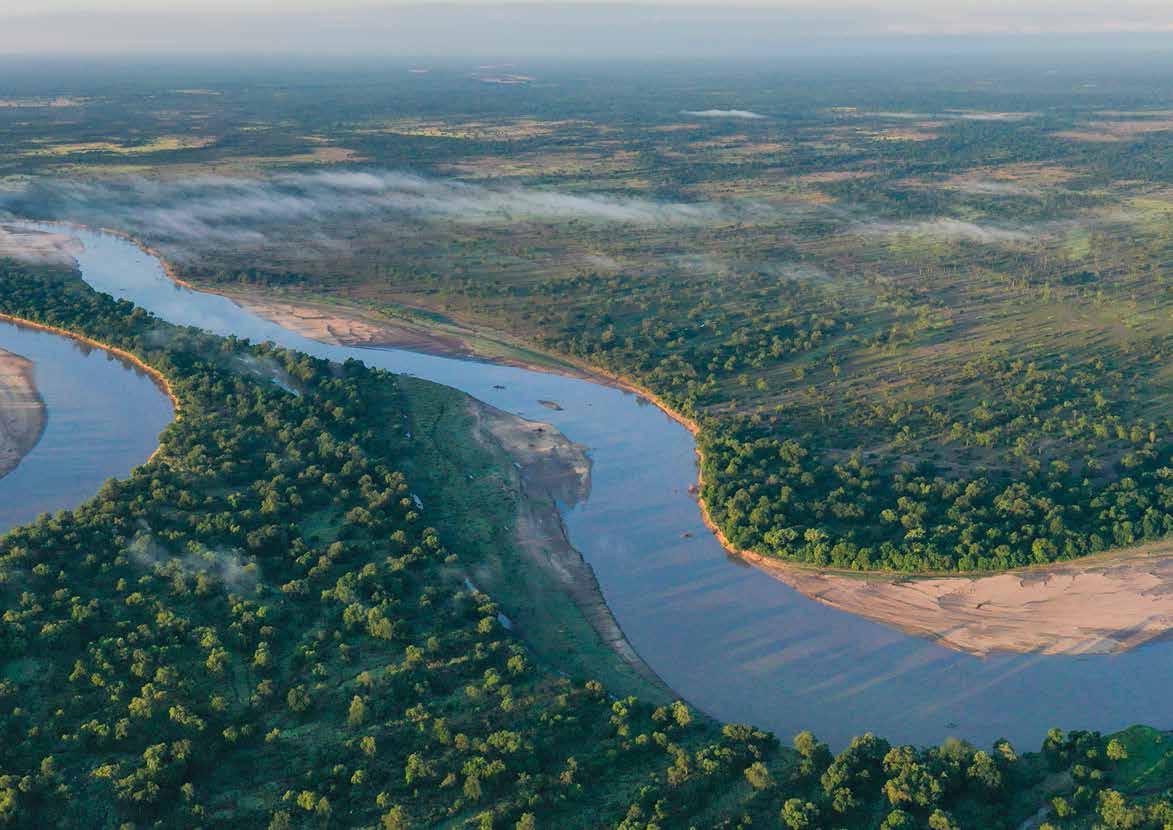
Major review and restructure of CSL’s operations, including expanding K9 Unit operations east to Chipata and the Malawi border. First implementation of SMART system, revolutionising the capture and use of key law enforcement data.
2020 COVID-19
Covid-19 hits and the tourism industry crashes in South Luangwa. CSL launches community game drives and community clean sweep initiatives with ZCP to support tourism workers affected by the pandemic and to ensure continued presence in the Park to deter an anticipated rise in poaching.
CSL and DNPW combine command and control centres, merging all operations for streamlined strategic operations, a major milestone in CSL’s long-term partnership with DNPW.
HWC RAPID RESPONSE UNIT
The CSL RRU, the first of its kind in Zambia, is established to provide support to communities and respond to reports of human-wildlife conflict that pose significant threat to human lives and livelihoods.
Following intensive training, an elite unit is formed combining highly specialised scouts from CSL’s K9 Unit, Quick Reaction Force and DNPW Intelligence and Investigations Unit, designed to apprehend suspects before wildlife is illegally killed and trafficked.
2023 SCOUT RECRUITMENT AND 20TH ANNIVERSARY CELEBRATIONS
We welcome 20 new CSL scouts, increasing the total number to 108 and the overall CSL team to 137. The team celebrates 20 years of conservation with an online silent auction and an evening with friends and partners at Marula Lodge, Mfuwe.
Over 20 years ago, a small and dedicated group of tourism professionals began working together to fight poaching in and around the South Luangwa National Park. The Luangwa Conservation and Community Fund (LCCF), initiated by Andy Hogg of The Bushcamp Company in 2011, provided funding early on, enabling CSL operations to grow and leverage further funding for anti-poaching work. CSL’s relationship with lodges and tour operators continues to be at the core of its operations. From financial and in-kind support to providing reports of snared animals or illegal activity, CSL works hand-in-hand with LCCF members to protect the Luangwa Valley’s unique wildlife and ecosystems. The funds donated by long-standing members of the LCCF are not restricted to specific projects or expenses, giving CSL invaluable flexibility to grow, adapt and respond to changing conditions each year.
In 2023, LCCF members collectively donated nearly $144,000 to CSL’s work. Thank you Mfuwe Lodge and The Bushcamp Company, Chiawa Safaris, Flatdogs Camp, Gavin Opie Safaris, Kafunta Safaris, Lion Camp, Remote Africa Safaris, Robin Pope Safaris, Shenton Safaris, and Time + Tide.
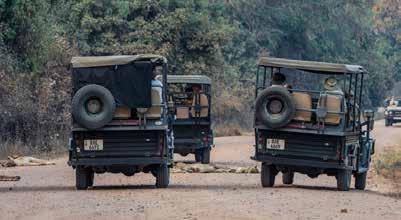
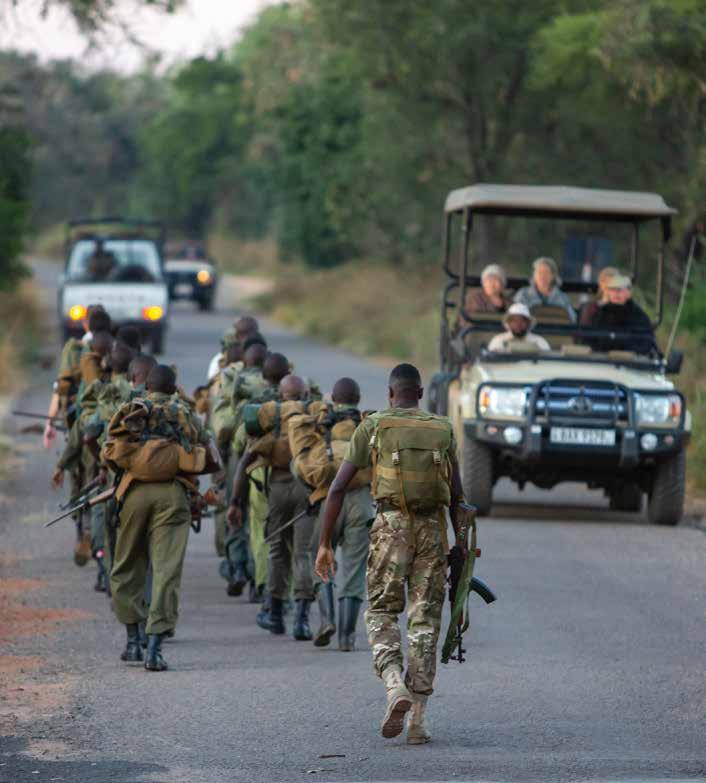
This year, CSL employed 137 full-time employees: 108 community scouts (including 25 female scouts), 11 senior management team members, and a further 18 support staff.
CSL also provided monthly volunteer stipends to 13 community data collectors for HWC assessments and 30 chilli patrollers.
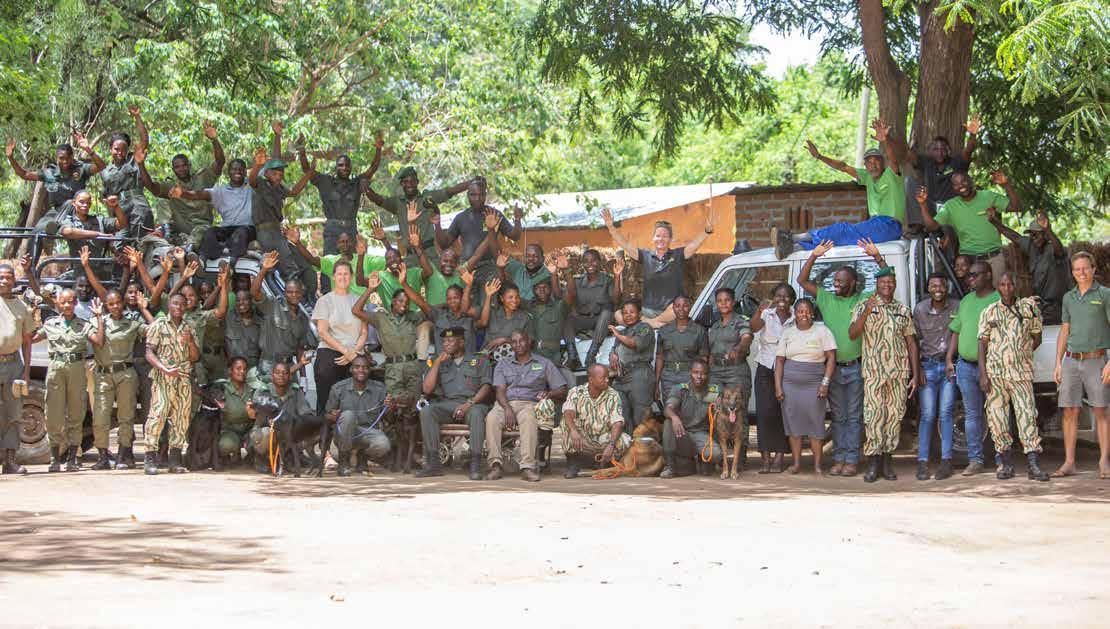
It is with a heavy heart that CSL reports the passing of a much-loved colleague, Jebson Tembo.
Jebson Tembo, affectionately known as ‘Jebbie’, was a kind and honest man with a youthful spirit. He was a committed husband, father and grandfather, with a deep faith. He was also a keen farmer with a wealth of knowledge.
Jebbie joined the Community Human-Wildlife Coexistence team in 2008 as a Field Officer in Nsefu Chiefdom. He shared many stories from his childhood in Nsefu Chiefdom, recalling his many encounters with wildlife. As a committed conservationist, he was dedicated to teaching people how to live alongside wildlife. He completed conflict data assessments, built grain stores, mentored new volunteers, advised on borehole locations and managed chilli patrollers. He always had time for others, quick to pitch in with teamwork and frequently provided guidance to bring people together. He was our man on the ground in Nsefu Chiefdom and his loss to cancer has been a huge blow to the CSL team. We will forever appreciate the years spent working alongside him, sharing in numerous adventures and moments of laughter. We will honour his memory through our work and we will never forget his generous spirit, wisdom, and patience. Rest in peace, Uncle Jebbie.
 Emma Robinson Human-Wildlife Coexistence Programme Manager
Emma Robinson Human-Wildlife Coexistence Programme Manager
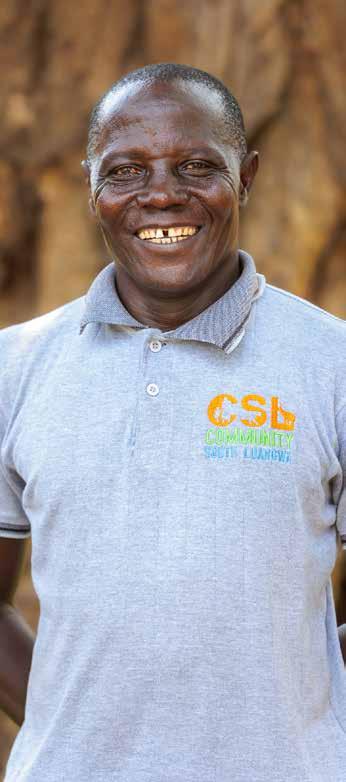
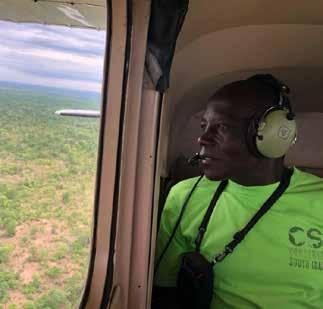
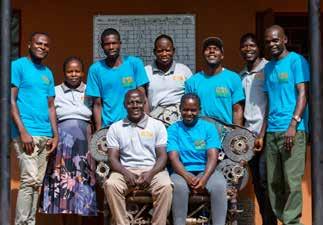
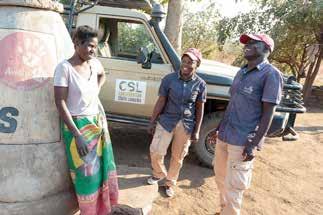
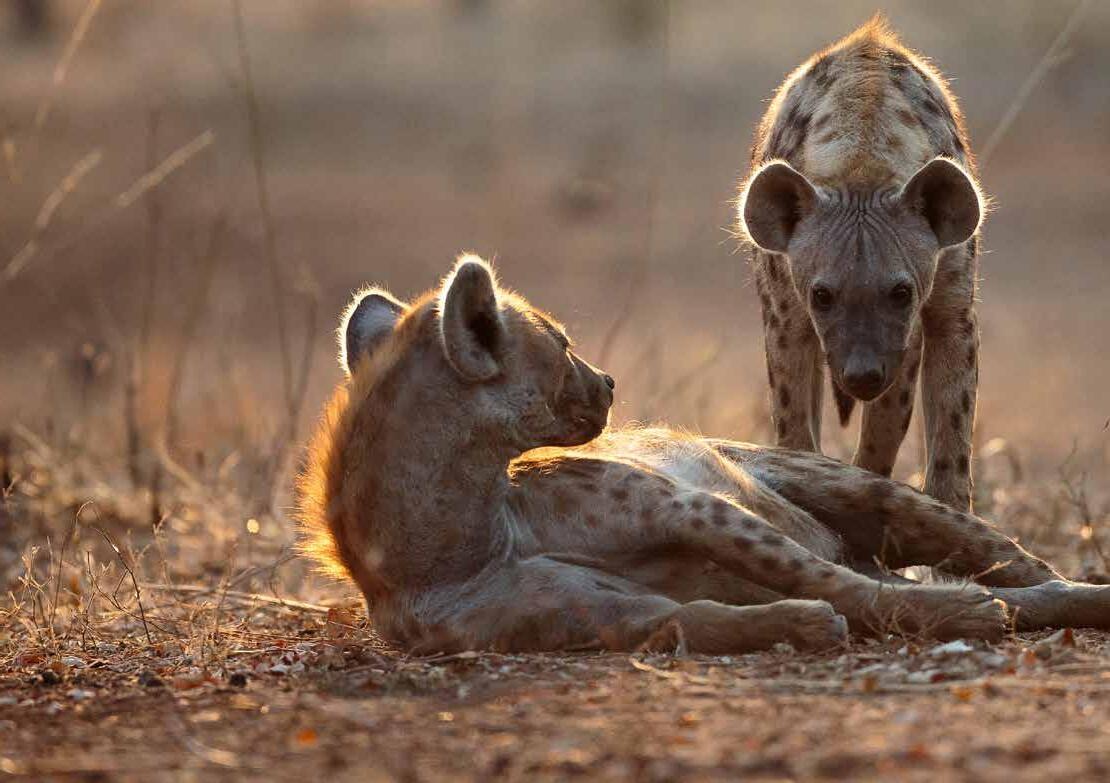
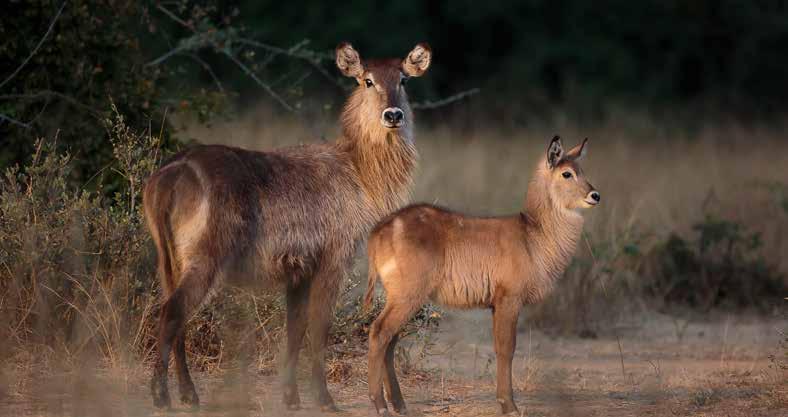
U.S. Bureau of International Narcotics and Law Enforcement Affairs
Tusk
Wildlife Ranger Challenge
Lion Recovery Fund
U.S. Fish and Wildlife Service
Mfuwe Lodge and The Bushcamp Company
Dazzle Africa
EJF Philanthropies
CSL is grateful to Zambia’s Department of National Parks and Wildlife for their long-term partnership and willingness to continue working closely together for the joint mission of conserving the wildlife and habitats of South Luangwa.
CSL would also like to thank the following donors and partners for their invaluable support of its work in 2023.
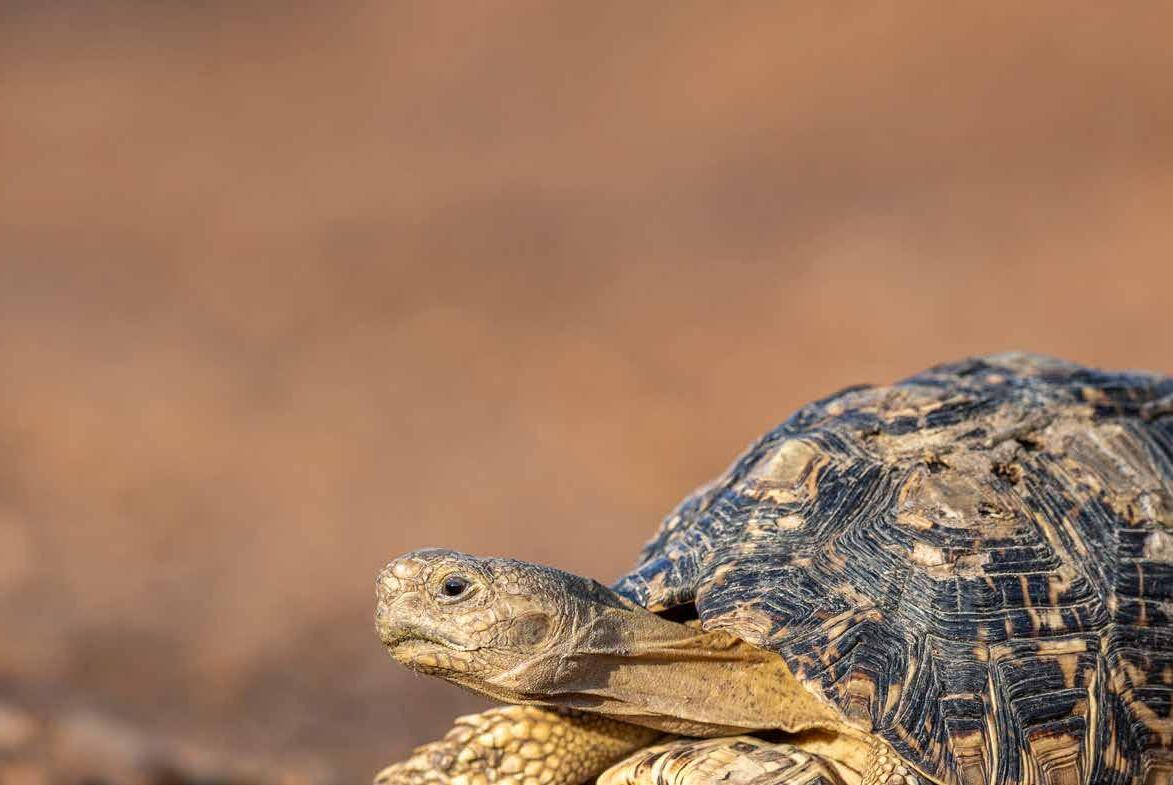
$50,000 - $99,000
Elephant Crisis Fund
Scheinberg Relief Fund
Working Dogs for Conservation
$10,000 - $49,999
Angela and Norbert Nelde
Deepak Raghavan Family Foundation
Elephant Charge
Explorers Against Extinction
Flatdogs Camp
Future for Elephants
Kafunta Safaris
Mark and Julie Mills
Painted Dog Conservation Inc.
Perth Zoo
Red Butterfly Foundation
Robin Pope Safaris
Shenton Safaris
Sibylle Broadmann
Sungani
Time + Tide
Wildlife Worldwide
World Wildlife Fund
Zambian Carnivore Programme
Zoo Atlanta
$5,000 - $9,999
Africa Hope Fund
Chiawa Safaris
Giraffe Conservation Foundation
Green Safaris
Humane Society International
Lion Camp
Remote Africa Safaris
Save Giraffes Now
Susan Stribling
Terrence O’Rourke
$1,000 - $4,999
Alec Lindsay
Allan Larson
Bud the Wonder Dog
Elizabeth Touma
Frank Petrus
Gavin Opie Safaris
Ian Shenton
Infinite Safari Foundation
Jacques Zenon
Jennifer Mayle
Louise Bolick
Make Me Smile
Mulberry Mongoose
Nicholas Aslin
Olivia Kennard
People and Places
Rufus Worne
Virginia Kubic
Wally Pohl
Wildlife Crime Prevention
Aisling Ryan
Alexander Hayes
Alison Bell
Amanda Dewey
Anne Schaal
Anne Sibblad
Arthur Carlson
Dr Bess Pierce
Dr Carl von Schreiber / Bermagui
Veterinary Clinic
Cartology Travel
Cassie Scheuer
Catherina Liddiard
Charles Olsson
Chris Brown
Chris Heptinstall
Christie Teilla
Chundukwa Foundation
Cley Dearsley
Craig Scheuer
Daniel Mangold
Daniela Falkenhagen
Dr David Bryan
Donna Cohen
Elise Robinson-Phillips
Emilia Leese
Emma Smithson
Gail Edwardson
Gid Carr
Gillian Greenway
Glenn Ringer
Gwen Harris
Hal Pearse
Keith Martens
Kerri Stoehr
Janine Paris
Jean-Michel Pavy
Jennifer Hall
Jirov Zejval
Joseph Rys
Josh Earhart
Joyce Dannheim
Judith Foord
Judy Jordan
Julie Bates
Juliet Sparkes Kind
Lesley Bird
Leslie and Bryan Diers
Linda and Conan Butcher
Linda Potter
Lisa Hurst
Lydie Delineau
Makolekole Drilling and Water
Solutions Ltd
Mango African Safaris
Mari Passanati
Martha Girolami
Moraway Adventures
Nidhi Shah
Pat Cole
Paul Engle
Paul Psychas
Paula Fitzpatrick
Peter Hayton
Petra Brinkmann
Petra Jordan
Puk Daniels
Sheda Morshed
Simone Anzboeck
Steven Fulker
Steven Segall
Teresa Simpson
T L van den Hoonaard
The Elephant Soul
Thomas Riley
Tribal Textiles
Verity Cherrez
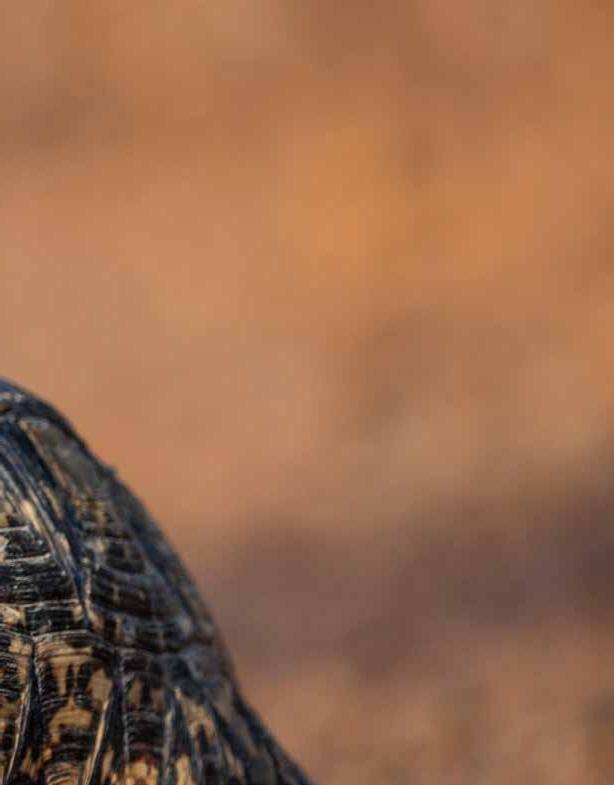
African Parks
Africa Pride
CC Systems
Edward Selfe Photo Safaris
Dr Eva Gross
Flatdogs Camp
Kalamo Productions
Niner Juliet
Project AnimalAid
Royal Canin Zambia (Brandline Dist Ltd.)
The Bush Spa
Tribal Textiles
Valley Lodgeistics
Wildlife Crime Prevention
Wildlife Protection Services
Working Dogs for Conservation
Amish Chhagan
Azimai
Chikowa Youth Development Centre
Chunya Nursery
Ciȇla Resort
Edward Selfe Photo Safaris
Flatdogs Camp
Green Safaris
Kafunta Safaris
Latitude 15
Lightfoot Zambia
Mayana
Mulberry Mongoose
Robin Pope Safaris
Royal Canin Zambia (Brandline Dist Ltd.)
Shenton Safaris
Sibylle Broadmann
Sishemos
Sungani
The Bushcamp Company
The Bush Spa
Thornicroft Lodge
Tribal Textiles
Valley Lodgeistics
WAYAWAYA
A special thanks to Mjose Jozie for documenting CSL’s work in photographs throughout the year. Thank you also to Bret Charman, Edward Selfe, Emma Healey, Eric Njobvu, Geraldine Taylor, Henry Mwape, Lauren Wendt, Marcus Westberg, Patrick Bentley and Rachel Rebibo for their images used in this report. Thank you Jess Aumonier for the report design.
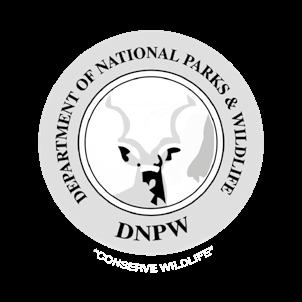

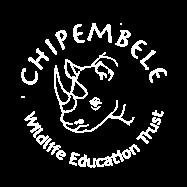





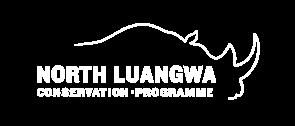


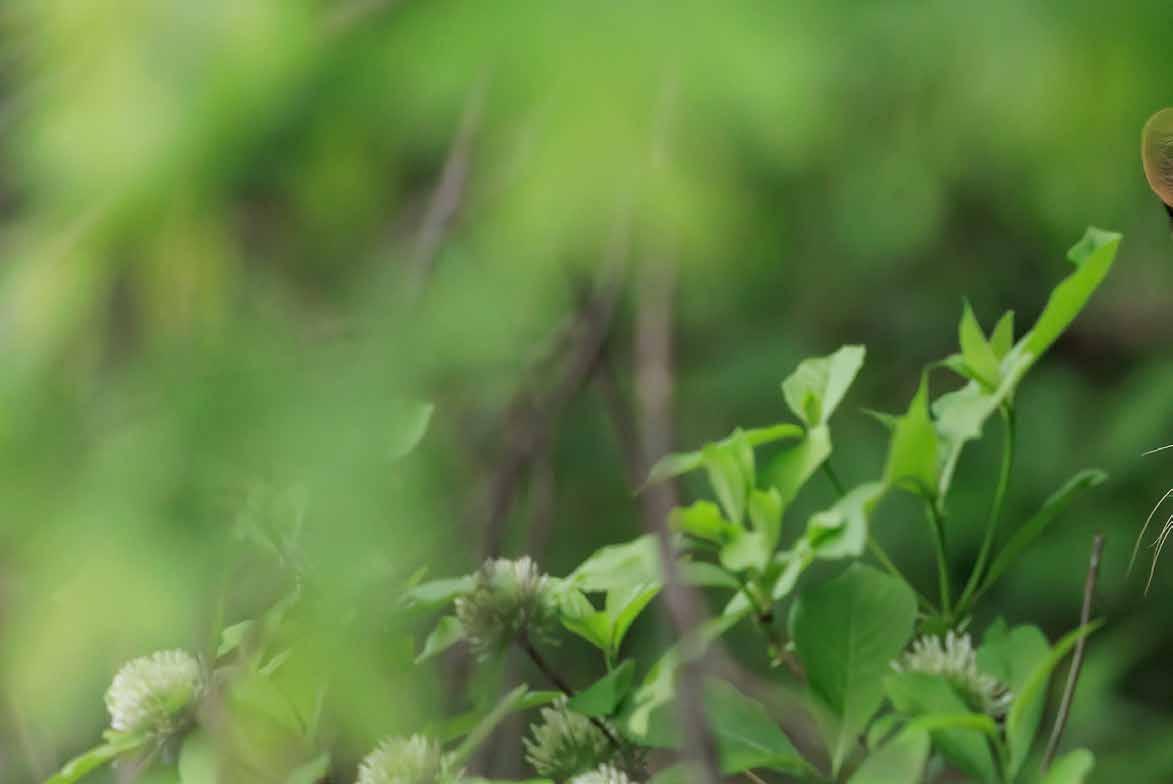
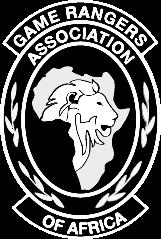






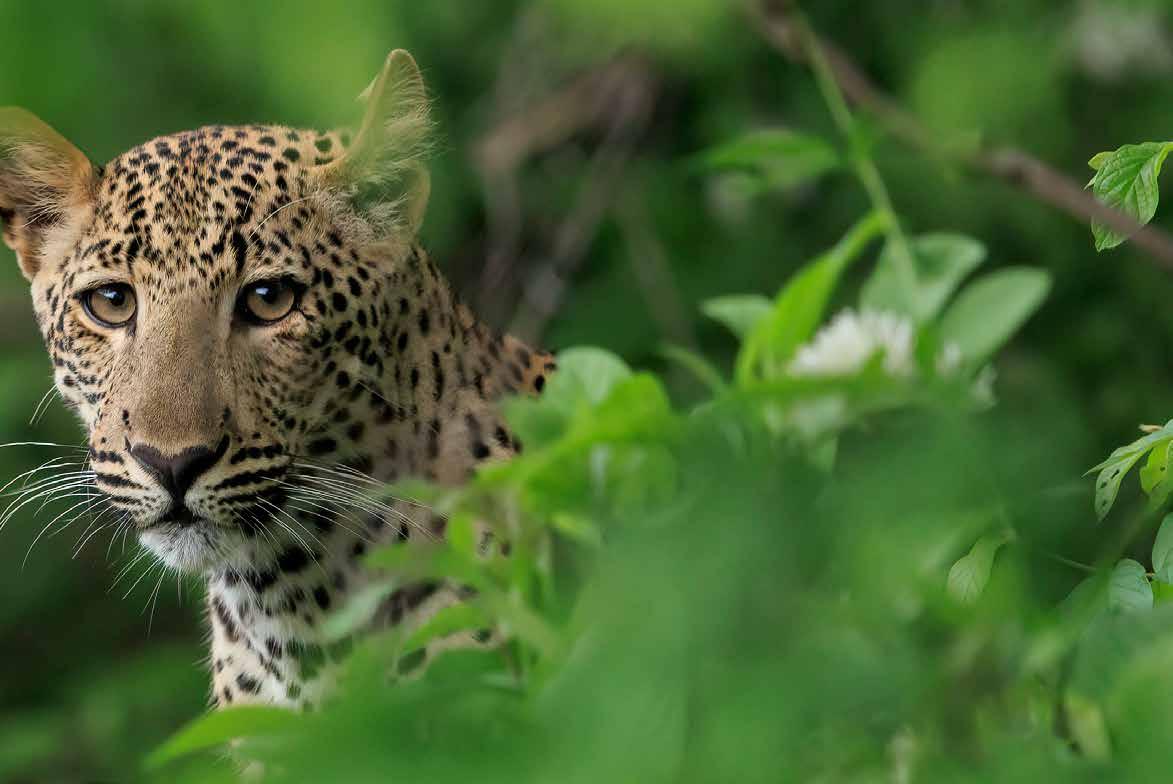
Conservation South Luangwa (Zambia)
Adrian Carr (Chair)
Carol Van Bruggen (Treasurer)
Edward Selfe (Secretary)
Nick Aslin
Simon Barnes
Chris Breen
Graph Evans
Shadrack Nkhoma
Aisling Ryan
Derek Shenton
For more information on how to support CSL’s work, please scan the QR code below.

Conservation South Luangwa (UK)
Alan Jamieson (Chair)
Simon Barnes
Chris Breen
Aisling Ryan
RNGO registration NGO/101/0010/2013
UK Registered Charity No: 1206897
